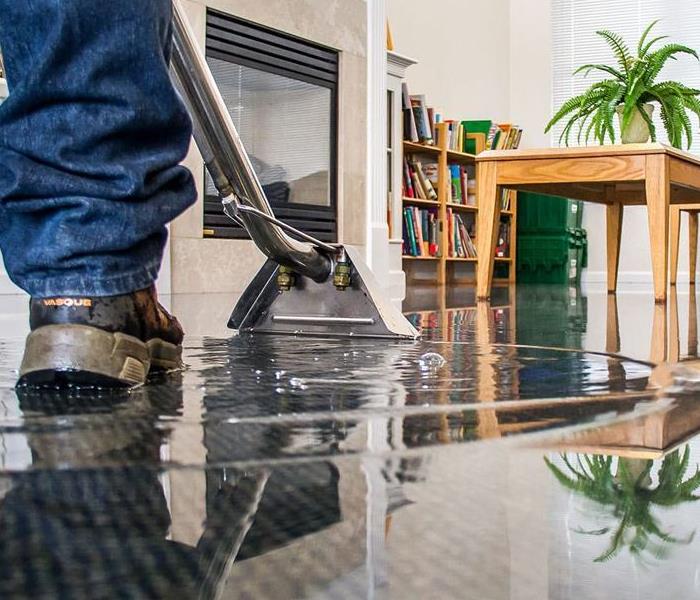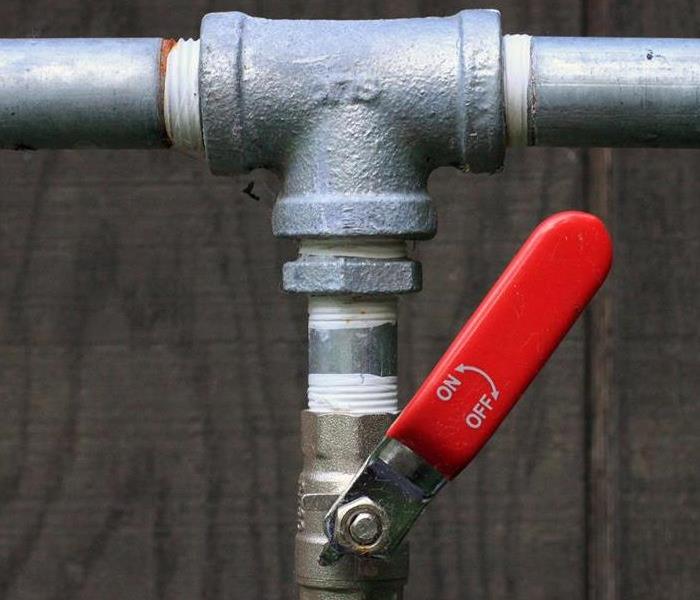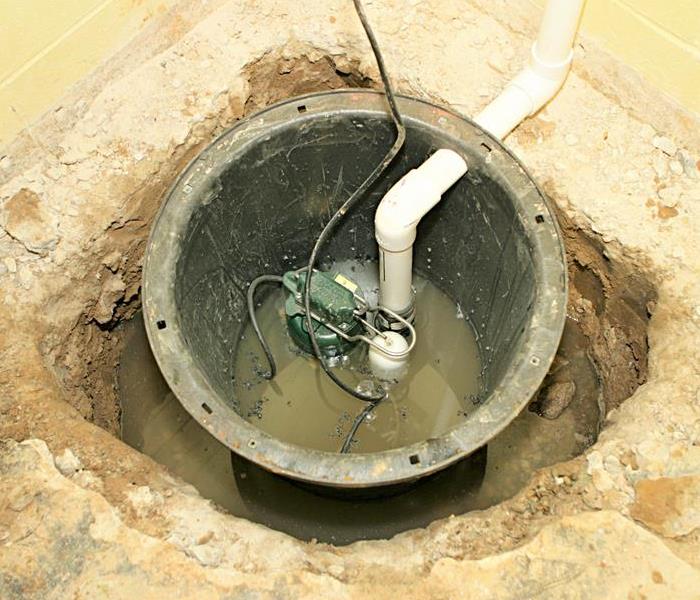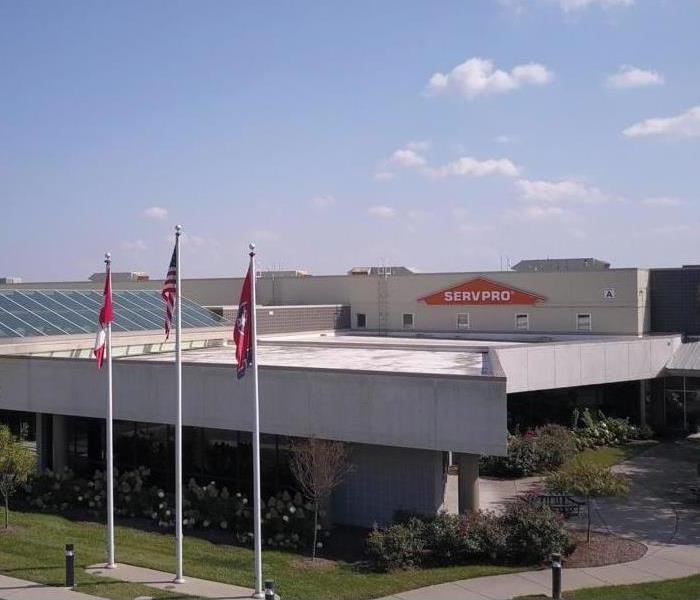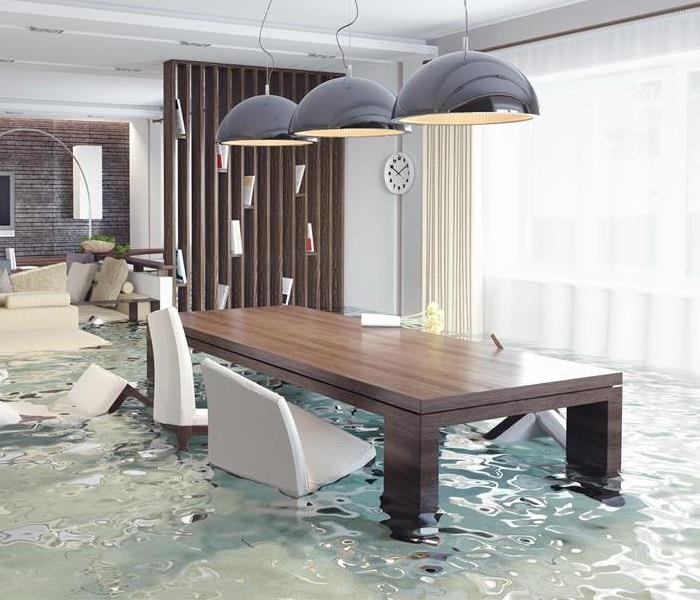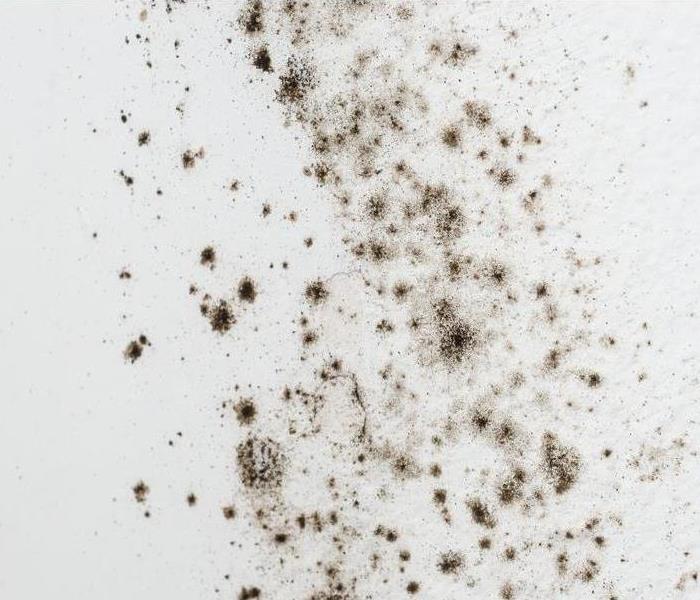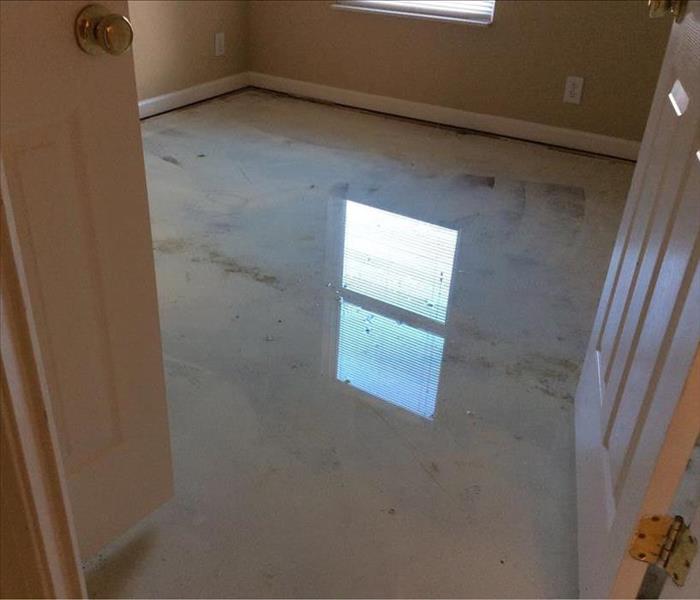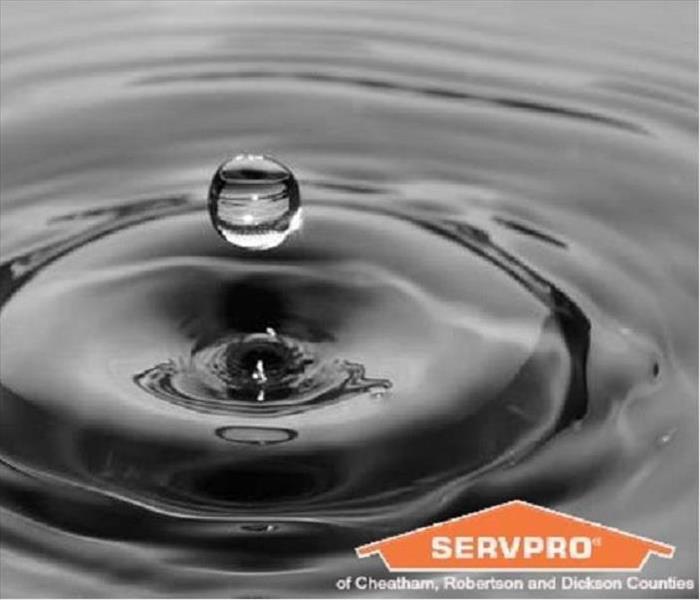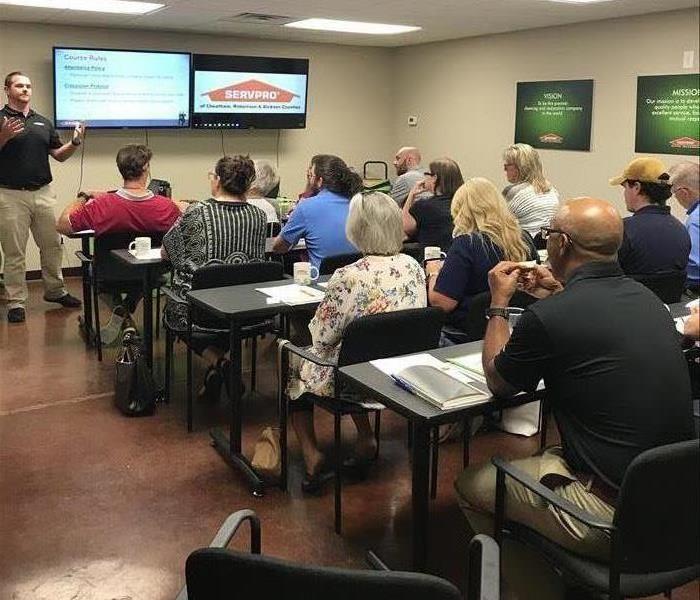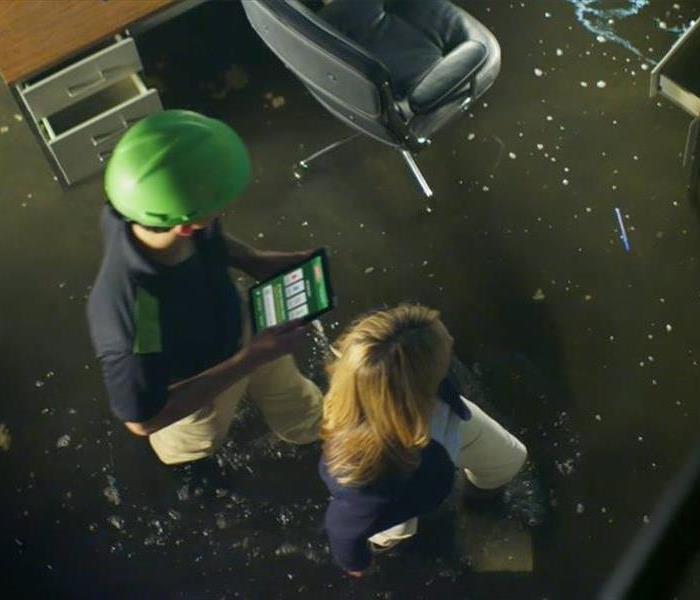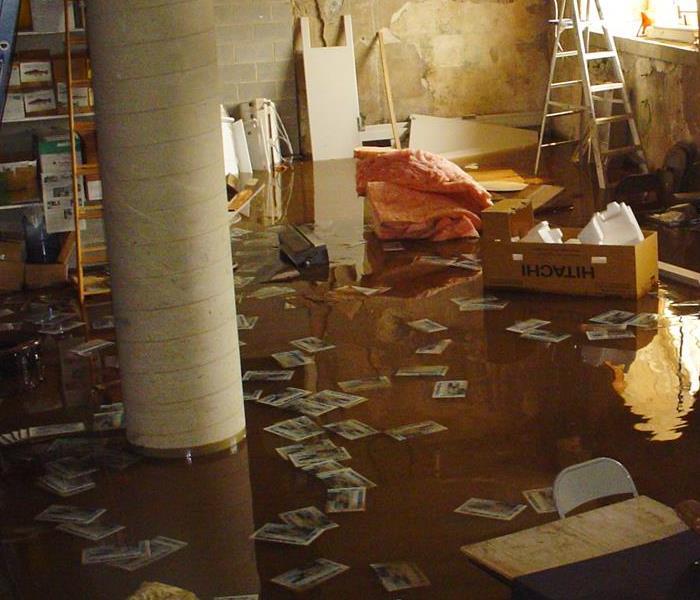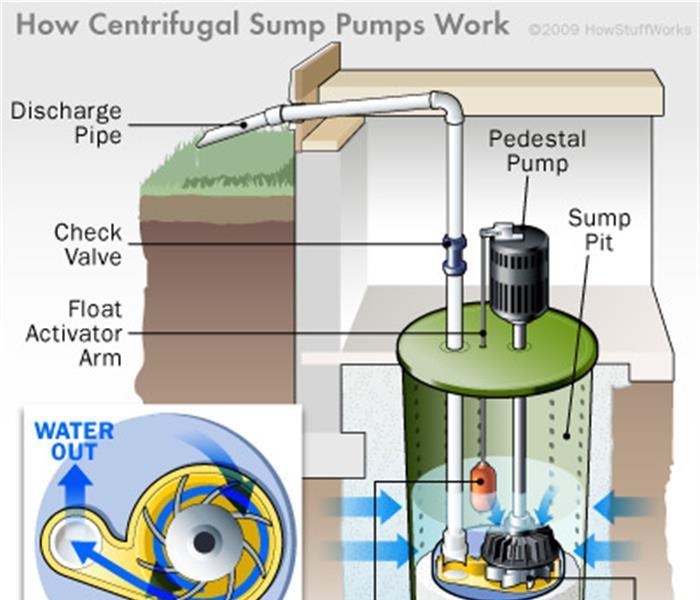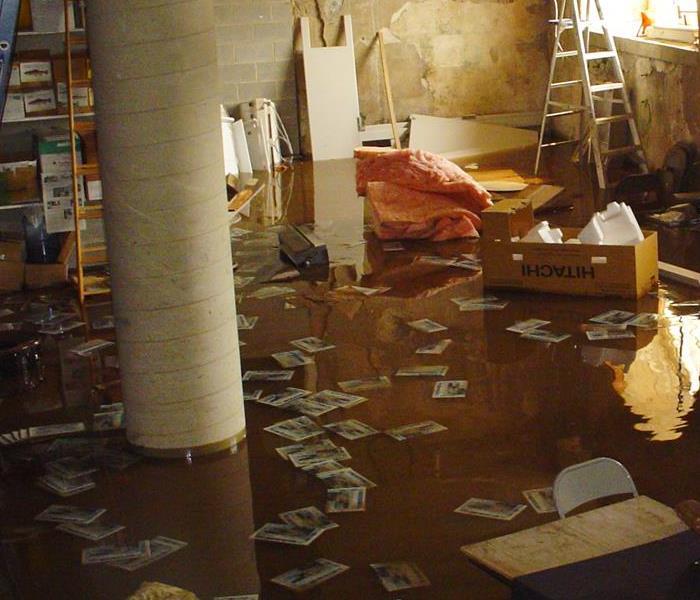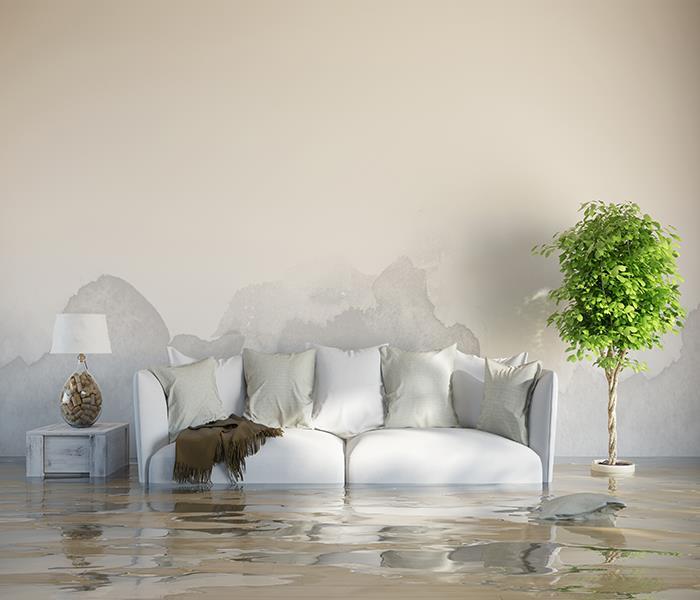Archived Water Damage Blog Posts
Winter Is Coming
1/3/2024 (Permalink)
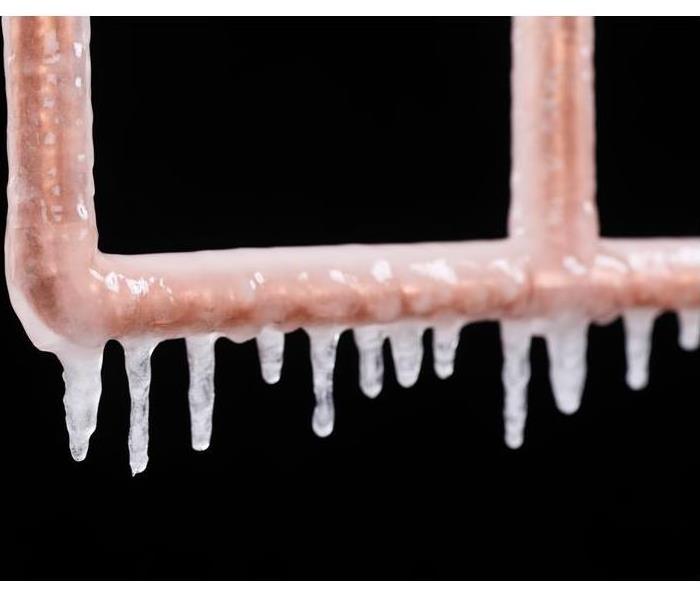 A picture of a frozen pipe that results in a water damage
A picture of a frozen pipe that results in a water damage
Now that Christmas and New Years has passed its time to shift our focus to Winter. Although the weather has warmer then usual for this time of year, colder tempertures are now on the horizon. With dropping tempatures comes the risk of frozen pipes and water damage.
Bursting pipes alone can result in thousands of dollars in water damage, including the amount of damage that can be done from a flooded basement or flood damage in other parts of your home.
Another important and dangerous winter issue is ice dams that collect on the roof. Ice dams are created from snow melting from a warm part of the roof back down to a cold spot where the water refreezes and forms a dam. The ice dams continue to build up over cold days leaving a pocket for water to sit and leak through the roof.
Here are some preparation tips to protect your home this winter:
Make sure to insulate pipes. Pipe insulation can cost as little as $0.50 per liner foot according to the Institute for Business and Home Safety.
Clean out gutters. By making sure there are no blockages in your gutters you can avoid ice dams, which cause water to back up and flow into the house.
Ensure there are no broken seals around windows and doors.
Check the roof for leaks or cracks in seals. These cracks usually form around vent and chimneystacks. Snow, which is mostly likely to collect on the downwind side of the roof, can cause damage to shingles.
What To Do When You Have a Water Damage
7/25/2023 (Permalink)
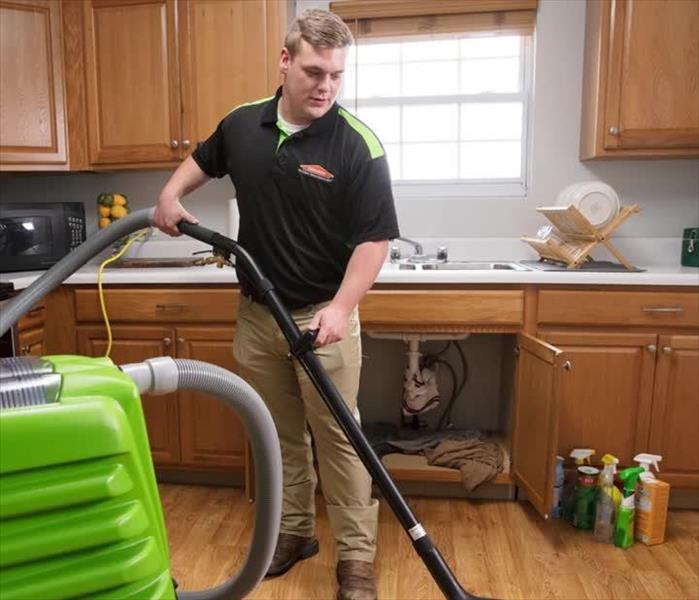 Removal of water from a customers home
Removal of water from a customers home
If your home or business just experienced a water damage this blog is for you. I'm sure a lot of questions are running through your head about who to call or what to do next. The first step is to call your local SERVPRO so they can inspect the damage to see if a claim needs to be filed. Why SERVPRO is on the way here are some tips to help minimize the water damage.
Water Damage from Clean Water:
- Shut off the water source if possible or contact a plumber if you cant find the source.
- Turn off circuit breakers for wet areas of the building.
- Remove as much excess water as possible by mopping or using towels.
- Put furniture on blocks to prevent the bottom from getting wet.
- Place aluminum foil or wood blocks between furniture and wet carpeting.
- Do not enter affected areas if electrical outlets, switches, circuit breakers or electrical equipment are exposed to water.
- Don't use a household vacuum to remove water. This could cause electrical shock or damage to the vacuum.
Water Damage from Contaminated Water (i.e. Sewage, Outside Water, etc.)
- Avoid all contact with sewage and any items contaminated by sewage.
- Wash your hands thoroughly after contact with contaminated items.
- Do not walk through damaged or wet areas. This could increase the possibility of spreading contamination.
- Do not use the HVAC system or fans to dry the structure, as this could spread contaminated air.
- Do not use any products for personal hygiene or cleanliness if exposed to the contaminated area.
Water Damage In Greenbrier
7/14/2022 (Permalink)
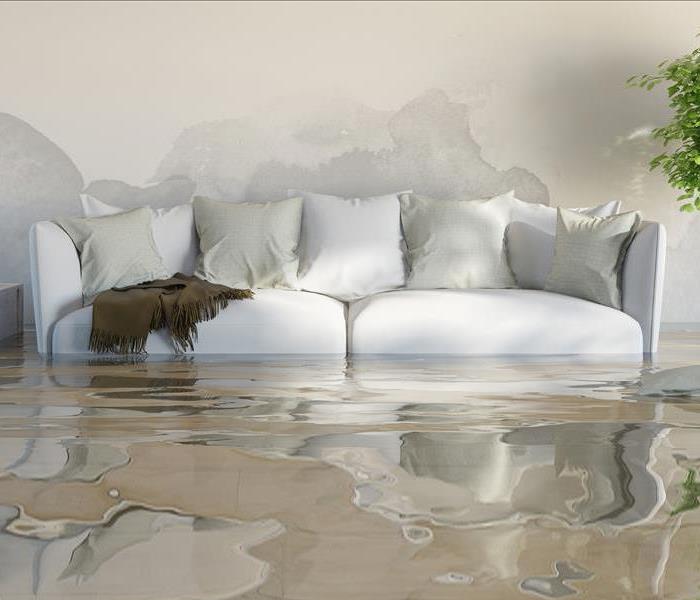 If your home has water damage call the professionals at SERVPRO
If your home has water damage call the professionals at SERVPRO
Water damage is traumatic, often to homeowners as much as their house. The first time you see the water damage is a shock; you may not know where to start in repairing it. However, there are steps you can take in the immediate time after a flood, burst pipe, or other damage that will make it easier to repair your home and move on with your life.
1. Stop the influx of water. You cannot repair water damage while water is still entering your home. If there is a pipe leak or other repair issue, turn off the water supply and have the problem repaired. If the damage is from a storm or flood, use sand bags or other ways of reducing the water. In some cases, people have to wait out the deluge when water damage is caused by a natural disaster.
2. Call your insurance company. It is important to know from the beginning what types of water damage your insurance company covers, as well as whether they will cover water removal and other services. Even if this is not an incident covered by your homeowner’s insurance policy, your insurance agent can still offer you advice.
3. Dry out your home. Standing water and wet upholstery can breed dangerous microbes in just 24 hours, so fast water removal is crucial to your future health. Mop or use a wet vac, bag up clothing and textiles, and throw away things like mattresses that hold moisture and cannot easily be cleaned. Open all windows and turn on fans. This will limit the growth of mold and bacteria while also limiting your exposure to whatever microbes are already present.
4. Call in the experts. Call professional mold inspectors who can look for remaining water in areas where it hides and immediately dry it out.
Water damage can be successfully dealt with if you immediately remove water where you can see it and have an expert deal with it where you can’t. Soon you will be once again enjoying a safe and dry home.
Water Damage Restoration
Basement flooding or storm damage doesn't wait for regular business hours and neither do we. We respond to your residential or commercial water removal and cleanup needs. Our fast response time and advanced drying methods help prevent secondary damage and mold. Common causes of water damage are:
- Flooding caused by severe weather
- Plumbing leaks
- Sink, bathtub or toilet overflow
- Sewage backup
Proper Drying
6/16/2022 (Permalink)
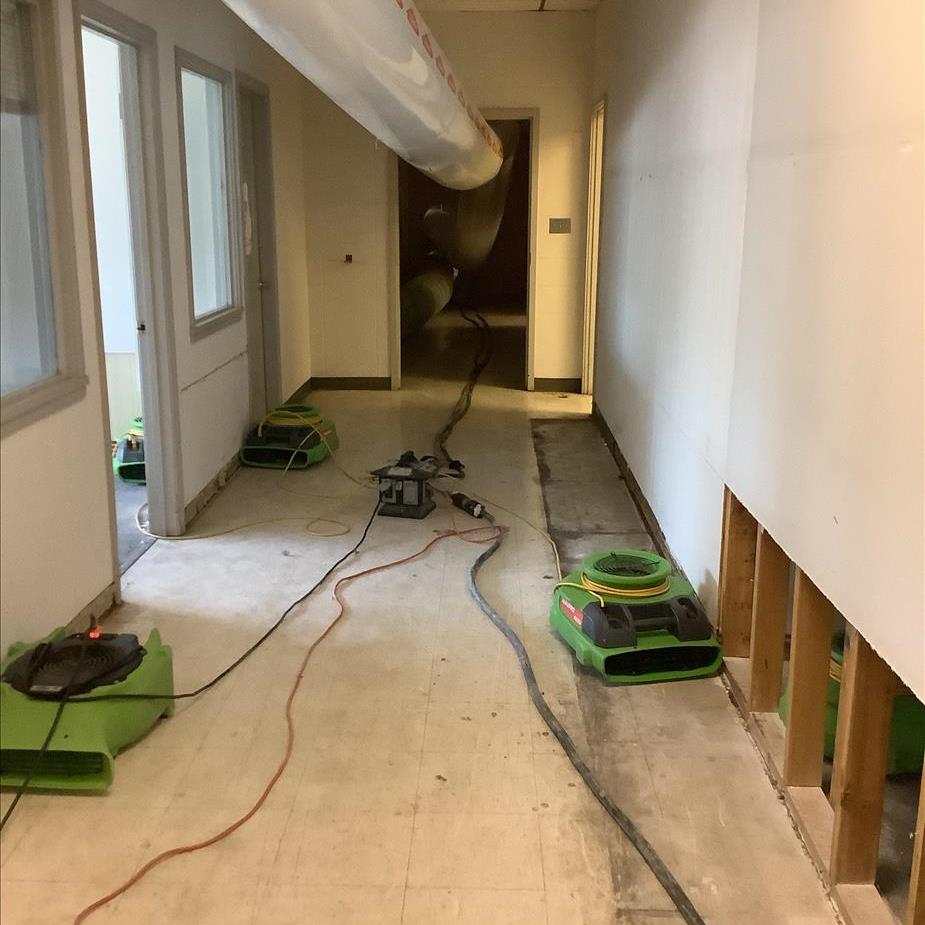 Flood cuts, air movers and a desiccant help dry out a commercial building.
Flood cuts, air movers and a desiccant help dry out a commercial building.
Drying out your home or place of business after a water damage can save you money and a lot of headaches. Not drying out your home or place of business can be costly and hurt one's property value. SERVPRO of Cheatham, Robertson and Dickson Counties has the drying process down to a science.
This industrial warehouse had a busted pipe causing water to affect a lot of rooms throughout. The loss happened on a Friday night and we were needed to get started as soon as possible. A significant amount of water affected much of the building. The picture shows our drying equipment along with flood cuts made into the drywall for proper drying.
When dealing with an unexpected emergency water damage at a small home or large commercial building, trust that professionals at SERVPRO to make it "Like it never even happened."
Important Qualities in Water Restoration
4/28/2022 (Permalink)
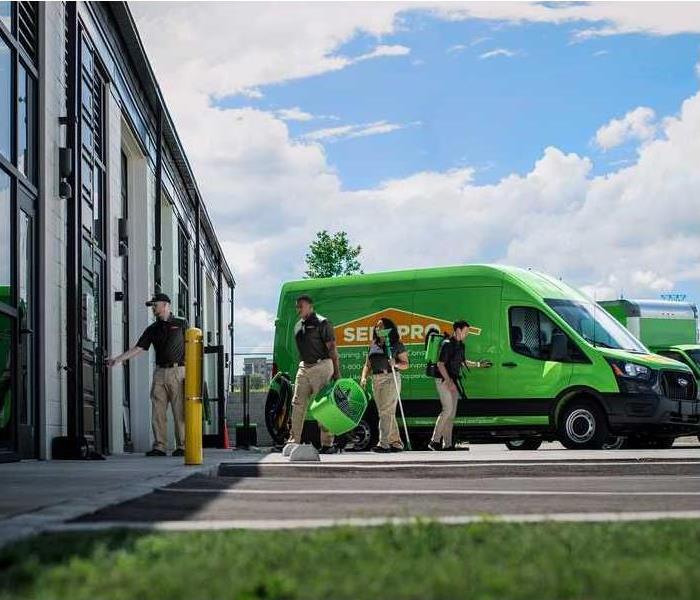 If your house or business has any type of damage call SERVPRO.
If your house or business has any type of damage call SERVPRO.
This blog will focus on a few qualities that anyone in the restoration field should consider. This industry is fast paced and always changing. Its important to know what your doing, but also be open to trying new techniques.
Communication
Whether you are a technician in the field, or working on the office side of things, communication is key. Make sure everyone knows their job and how to do it. Also, make sure all the stakeholders on the job are updated daily on progress and what to expect next.
Training
Just because you have been in restoration for years doesn't mean you should stop sharpening your skills. There are numerous classes and certificates that can be obtained to help you increase your knowledge and skill.
Documentation
If you don't document it, it never happened. We live by that statement at our office. Everything you do on a job site needs to be documented. This also circles back to communication. If the documentation is good for a job everything else will go smooth with it.
Water Damage in Ashland City
4/21/2022 (Permalink)
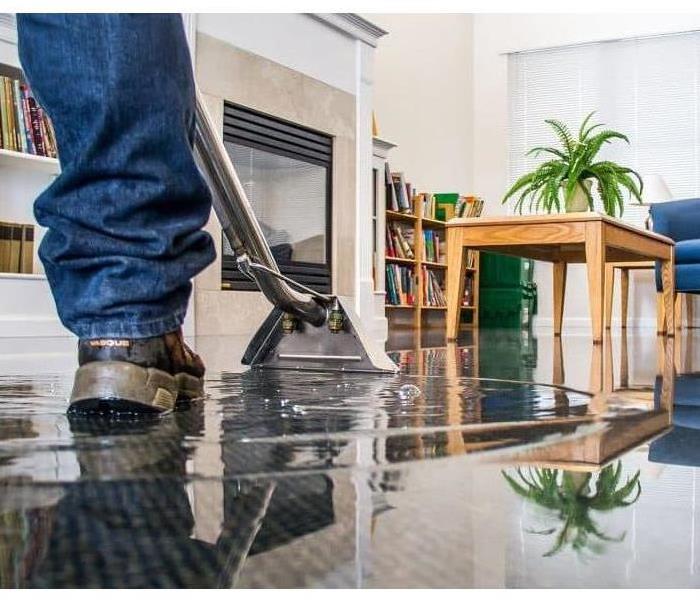 If your home is Ashland City is affected by water damage give SERVPRO of Cheatham county a call
If your home is Ashland City is affected by water damage give SERVPRO of Cheatham county a call
If your home is flooded, then you need to spring into action. It is important that water removal is accomplished in a timely manner to prevent damage to your home. There are other problems that water causes such as unhealthy indoor air quality. You can physically remove wet items and carry them outdoors to dry. A large fan will help with water removal in Ashland City, Springfield, Dickson White House and Greenbrier to dry items faster. High humidity levels can affect every member of your family in a negative manner. If you have family members with respiratory problems, then it is important that you get rid of excess water.
Consider hiring a company that specializes in water damage. They will bring professional equipment that will dry your home faster. This is important to prevent damage to your floors, walls and ceilings. Protect yourself and your family by wearing a respiratory mask while cleaning up after water damage. Throw away items that have been saturated with water such as mattresses, rugs and carpets.
Water damage can also occur due to damaged water or sewer lines. If the sewer has backed up into your home, you must take steps to prevent bacteria from entering your home. Consult a professional water damage company for best results. Consult with your insurance agent to find out what items are covered. Some homeowner's policies do not cover damage due to flooding or other disasters. Prepare ahead of a disaster by storing items such as canned foods and important papers inside plastic containers and bags. Important information such as insurance policies should also be protected.
If your area weather station is reporting possible flooding in your area, then you should unplug all appliances. Turn the electricity off before you vacate the premises. It is important to prepare ahead for natural disasters that can catch you off-guard. Make sure all family members know what to do in case of an emergency. Never use your household vacuum to remove excess water. A professional water damage company has equipment to remove water safely and efficiently. Contact a professional before an emergency situation unfolds in front of you and your family.
SERVPRO of Cheatham, Robertson & Dickson Counties proudly serves Springfield, Dickson, White House, Ashland City, Greenbrier, Pleasant View and surrounding areas. We are available 24 hours/7 days a week and are ready to restore damage to your home or business.
Just had a water damage. Now What?
2/15/2022 (Permalink)
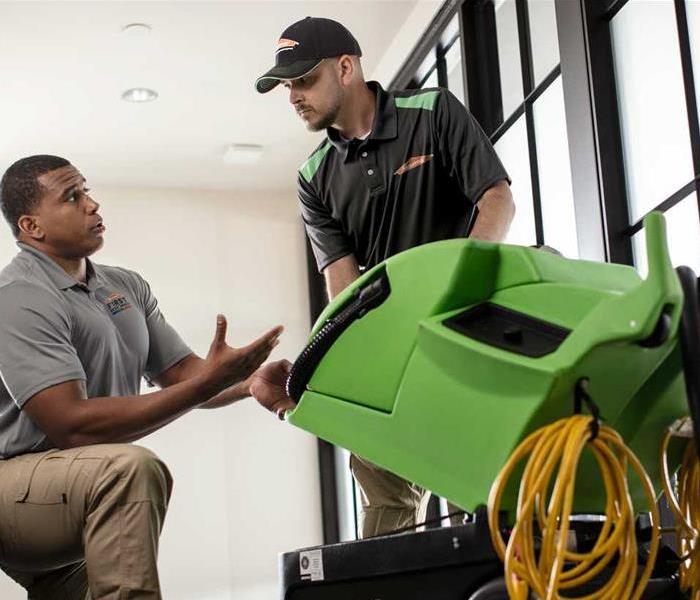 Tips while waiting for help to arrive
Tips while waiting for help to arrive
If you just walked into your home and business and found standing water this blog is for you. These emergency tips will help you take the proper action until we arrive on the scene. These tips can help reduce damage and increase the chances of a successful restoration.
Water Damage from Clean Water:
- Shut off the water source if possible or contact a qualified party to stop the water source.
- Turn off circuit breakers for wet areas of the building, if access to power distribution panel is safe from electrical shock.
- Remove as much excess water as possible by mopping or blotting.
- Wipe excess water from wood furniture after removing lamps and tabletop items.
- Remove and prop up wet upholstery cushions for even drying.
- Place aluminum foil or wood blocks between furniture and wet carpeting.
- Remove to a safe, dry place any paintings, art objects, computers, documents and other materials that are valuable or sensitive to moisture.
- Do not enter affected areas if electrical outlets, switches, circuit breakers or electrical equipment are exposed to water. Always avoid electrical hazards.
- Don't use a household vacuum to remove water. This could cause electrical shock or damage to the vacuum.
Water Damage from Contaminated Water (i.e. Sewage, Outside Water, etc.)
- Avoid all contact with sewage and any items contaminated by sewage.
- Wash your hands thoroughly after contact with contaminated items.
- Do not walk through damaged or wet areas. This could increase the possibility of spreading contamination.
- Do not use the HVAC system or fans to dry the structure, as this could spread contaminated air.
- Do not use any products for personal hygiene or cleanliness if exposed to the contaminated area.
Preventing Water Damages In The Winter
11/11/2021 (Permalink)
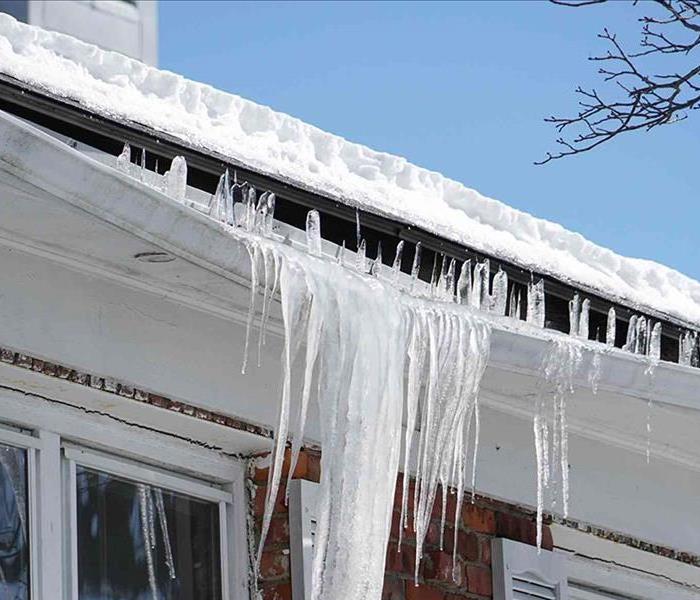 Ice damning is one of the main causes of water damage during the winter
Ice damning is one of the main causes of water damage during the winter
The past couple of years have brought on bitter cold winters and unexpected climate changes. This winter is holding true to form as we battle the current ice storm. These frigid temperatures can result in frozen/burst pipes & ice dams.
Bursting pipes alone can result in more than $5,000 in water damage, including the amount of damage that can be done from a flooded basement or flood damage in other parts of your home.
Another important and dangerous winter issue is ice dams that collect on the roof. Ice dams are created from snow melting from a warm part of the roof back down to a cold spot where the water refreezes and forms a dam. The ice dams continue to build up over cold days leaving a pocket for water to sit and leak through the roof.
Here are some preparation tips to protect your home this winter:
Make sure to insulate pipes. Pipe insulation can cost as little as $0.50 per liner foot according to the Institute for Business and Home Safety (IBHS).
Clean out gutters. By making sure there are no blockages in your gutters you can avoid ice dams, which cause water to back up and flow into the house.
Ensure there are no broken seals around windows and doors.
Check the roof for leaks or cracks in seals. These cracks usually form around vent and chimneystacks. Snow, which is mostly likely to collect on the downwind side of the roof, can cause damage to shingles.
Water Loss Categories
7/16/2021 (Permalink)
Every water damage is different. From how the loss occurred to what is affected. That's why is extremely important to hire a good restoration company when you experience a water damage. One of the first things we do on any water loss is determine the category of the water.
There are three separate categories of water. Category 1 water comes from a clean source. This type of water has no risk if inhaled on ingested. Some examples of a Category 1 loss would be a broken water supply line or tub overflow.
Category 2 loss could cause potential sickness if consumed by humans. This water loss can contain unsafe levels of microorganisms. Some examples of category 2 water would be a washing machine or dishwasher leak.
The final and most dangerous category of water is 3. This would be water that contains sewage or any type of flooding. its very important to determine which category of water you are dealing with before you start mitigation work.
The Most Important Water Damage Tip
6/22/2021 (Permalink)
We have dedicated blogs in the past to tips for homeowners who experience a water damage. Most of the advice consist of calling a restoration company as soon as possible. Or elevating furniture and electronics off the ground. While these are still great tips, the most critical advice for homeowners is to know where your main water shut off is located.
Most of the time it is located in the front yard by the road. In new construction homes it could even be in the garage. If you are not aware of where your main water shut off is please find it today! By shutting off the water during an emergency you will save yourself a lot of money.
The longer the water is running the more damage will occur. The faster you can shut off the water the less damage will occur inside the house.
Sump Pump Failure
4/28/2021 (Permalink)
Sump pumps provide great value to basements. They sit in the lowest spot and immediately starting pumping water out as soon as its detected. They can help save your home from water damage. Like any other mechanical device, sump pumps can still fail. When this happens its important to call SERVPRO to come inspect your home. Here are some of the main reasons for Sump Pump failure.
Power failure – The most common cause for failure of a sump pump is a power outage. As we know, most power outages happen when we need the sump pump most, during a storm. Purchasing a backup generator to keep your sump pump moving during a storm can save your home from a flooded basement.
Improper installation – The installation of a sump pump is crucial to it working properly. One mistake or misstep in following the manufacturer instructions can lead to water to be displaced. Make sure to follow the manufacturer’s manual or consult a professional to make sure the sump pump is installed correctly.
Frozen or clogged discharge line – The discharge line is where the water exits the home. It is important to make sure that the line is protected from freezing and does not have debris such as dirt, rocks and sticks. A grated discharge line will give water a separate way to flow in case of a blockage.
Lack of maintenance– Manufacturers recommend testing and running the pump every 2-3 months.
Switch problems – The purpose of the sump pump is to automatically turn on when a sensor notices that there is water build up. If the pump gets shifted and moves position inside of the basin, it can cause switch to be inaccurate and not know where the correct water level is, making the pump not switch on at the correct time.
Training Water Damage Technicians
4/22/2021 (Permalink)
Though IICRC does not in fact operate its own school, it does recommend the best water damage restoration technician training courses per industry standards. Take a look at what a certified professional has studied in order to be good enough for the SERVPRO name.
Time is of the essence after a major water disaster. Though Journeyman-certified technicians may be the right choice for water damage that does not threaten structural integrity, it is vital to bring an IICRC certified Master professional to the scene of a major disaster as soon as possible. Certified professionals use the skills they’ve learned in the accreditation courses to examine the structure, textiles, and the belongings, and will likely be able to control the damage, so no further damage will occur.
Furthermore, knowing the fastest and best means of drying the structure and textiles is imperative. Familiarity with the most effective processes and safest compounds to stop the spread of molds and microbes is also needed to protect people and animals in the environment. Graduates of the relevant IICRC-approved classes excel in these areas.
The importance of providing customer satisfaction cannot be over-emphasized. Each certified technician must pass a stringent series of exams prior to acceptance, and continual training is required. Complaints are taken seriously and must be handled promptly to ensure continued accreditation as a certified firm.
Water damage restoration technician training is a surefire way to insure the latest and greatest procedures are used to protect a customer’s property. There are various courses of study and ways to learn the information, so IICRC works with both the consumer and the professional to guarantee the best experience. Don’t forget to look for the SERVPRO symbol to find the best possible solution for your water-based damage.
24 Hour Water Damage In Cheatham County
2/10/2021 (Permalink)
Title: Cheatham County 24 Hour Emergency Water Damage Service
SERVPRO of Cheatham County is available 24 hours a day for water emergencies, large or small. When you are dealing with water damage, immediate action is crucial. A delay of just a few hours can greatly increase the severity of the water damage.
We Answer the Phone Ready to Help.
Call Today - (615) 672-1905
We understand that when you call us, you may be feeling confused, stressed, and vulnerable. You need an expert to guide you through this crisis. SERVPRO of Cheatham County has the specific water damage training and experience to help you through this tough time. We specialize in water damage restoration—in fact, it's the cornerstone of our business.
What to Expect
When you call, we will ask several questions regarding your water damage emergency. These questions will help us determine what equipment and resources to bring, including how many trained SERVPRO Professionals may be needed.
Our SERVPRO Representative will ask several questions:
- Your name and contact information
- Your insurance information (if applicable)
- The street address of the water-damaged home or business
- When did the flooding or water damage occur?
- What caused the water damage (if known)?
- Is there electricity available (on-site)?
About SERVPRO of Cheatham County
SERVPRO of Cheatham County specializes in the cleanup and restoration of residential and commercial property after a fire, smoke or water damage event. Our staff is highly trained in property damage restoration. From initial and ongoing training at SERVPRO’s corporate training facility to regular IICRC-industry certification, rest assured our staff is equipped with the knowledge to restore your property.
Certifications
- WRT - Water Damage Restoration Technician
- ASD - Applied Structural Drying Technician
- UFT - Upholstery & Fabric Cleaning Technician
- ASCS - Air Systems Cleaning Specialist
- SRT - Fire & Smoke Damage Restoration Technician
- OCT - Odor Control Technician
- CCT - Carpet Cleaning Technician
- RRRP - Lead-Based Paint Activities and Renovation
- IICRC Certified Firm
- RRT - Carpet Repair & Reinstallation Technician
- OSHA - 10-hour General and/or Construction Industry Training Program
- CVI - Certified Ventilation Inspectors
- OSHA - 30-hour General and/or Construction Industry Training Program
- ECTP - Employee Certification Training Program
Finding A Reputable Water Damage Company
12/22/2020 (Permalink)
Finding Reputable Water Damage Companies
Water damage companies often have to work in some grueling circumstances, but their efforts are essential to restoring the home to a healthy state. Floods, sewage backflows, leaky plumbing, or roofing and burst pipes can all cause a massive headache for a homeowner, and they need a professional who is skilled and honest. This is easier said than done as the industry lags behind in terms of oversight. However, there are some simple checks that a homeowner can use to determine whether or not they’re dealing with a reputable business.
What are the signs of reputable water damage companies?
Businesses that perform at a high level have little to hide, so they should be easy to contact and have an established website. As disaster can strike at any time, restoration technicians have to be on call around the clock. Reputable businesses will be available 24 hours a day most days, so the homeowner doesn’t have to wait. The critical period for preventing additional damage is 48 hours. After 48 hours, contaminated fluid will ruin many materials it soaks through, though some organic materials will deteriorate at a faster rate. It’s common for technicians to need to remove drywall, carpeting, baseboards, and casings, but many textiles are salvageable if the technicians respond quickly and the water causing the damage was not sewage.
If a company can dispatch technicians to the home right away and provide a detailed estimate of the process, this is a good sign. It takes a variety of skills to restore the home to a preloss state, which means the firm will have to maintain a highly skilled and well-trained group of professionals. If a company doesn’t offer all of the services needed to completely restore the home, find one that can. For example, if a firm can't remove mold or other microbial threats, your family may be at a major health risk, even after everything is dried and put back to normal.
In general, homeowners should only consider water damage companies that have attained certification through a respected training organization. For restoration professionals, this is the Institute of Inspection, Cleaning and Restoration Certification (IICRC). IICRC-approved schools have trained up restoration professionals for years, and its classes cover a range of topics pertinent to restoration technicians. This includes the theory of water damage, how it affects the home, what materials are at risk, how to remove excess moisture from the building, how to perform structural drying properly, how to inspect and remove pathogens, and how to save sensitive materials like wooden floors. Attaining certification through the IICRC requires hard work and an ongoing commitment to the field, as registrants must earn continuing education credits annually. Homeowners can rest assured that if they are dealing with a certified crew, they are dealing with some of the best in the business.
10 Places Where Water Damage and Mold Occurs
11/16/2020 (Permalink)
10 Unexpected Places Where Water Damage & Mold Creeps Into Your Home
If a fixture or appliance in your home uses water, chances are it will leak at some point. These are 10 places many homeowners overlook when checking for water damage or mold:
- Dishwasher
There are two connections under each dishwasher that have the potential for mold and mildew to get started–the water supply and the discharge connection. The water supply needs to be lubricated with the right sealant and properly tightened periodically. The discharge connection involves a rubber hose and clamp, and installing the hose before the dishwasher is installed ensures it is done properly. Hoses wear out over time. If you’re buying an older house, it doesn’t hurt to check the dishwasher connections — especially if there’s an odd smell when you open the door.
- Icemaker Connections
Refrigerators often get moved, either for cleaning or other projects. This can weaken or break the water line connection to the ice maker, causing leaks behind the refrigerator.
- Washing Machine Connections
When installing a washing machine, always install a new hose, using the rubber washers the manufacturer recommends. Also, use Teflon tape and make sure to tighten the connection with vice grips so there are no drips or leaks.
- Hot Water Heater
Many states have laws regarding the installation of hot water heaters, and most of them involve overflow pans that are piped to drain outside the house. The pan must be tilted at least ¼ inch to ensure the water does drain. Newer heaters with quick connect connectors should be properly lubricated and tightened so the shut-off valve doesn’t leak.
- Plastic P-Traps
Under every sink in your home is a “P-Trap,” almost always made of PVC pipe, which expands, and contracts. This process eventually loosens the connection and can cause leaks. Use Teflon tape to seal every P-Trap and check them periodically, tightening them by hand to ensure their connections don’t loosen and leak. Be careful, over tightening PVC can cause it to crack.
- Toilet Connections
The base of the toilet is where most mold grows. Toilets should be installed with a horned wax ring, and then the base of the toilet grouted in with tile grout. The grout serves as a filler between the bowl and the floor to keep the bowl from rocking – which can compromise the wax ring. Also, make sure the toilet supply line is well-connected.
- Shower Doors
To insure proper installation, we recommend shower doors be installed by a licensed plumber. Mold growing at the base of the tub may be from leaking or improperly installed shower doors. Shower doors need caulking on all three rails — the two side rails as well as the bottom rail.
- Tub
The best way to prevent a leak from a tub is to make sure it is installed properly. If installed improperly, water and moisture can drip down under the tub causing water damage and mold issues.
- Exterior Water Connections
If you’ve used a hose, you know how a poor connection or missing rubber washer can cause water to spray onto the house. This uncontrolled spray allows water to enter the space between the siding or into the wall leading to water damage and mold growth.
- Outdoor Water Sprinklers
Make sure your sprinklers are well away from the house when turned on. The siding on your house is engineered to shed falling water (rain), not sprinklers shooting water up.
If you take the proper precautions and monitor your home regularly, you should be able to avoid mold or at least catch it very early at its onset.
Water In Basement
11/4/2020 (Permalink)
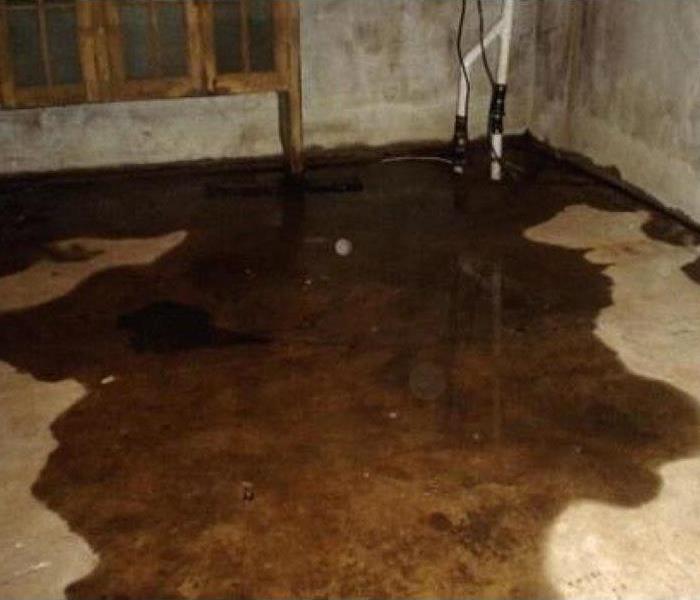 Call SERVPRO if you have water in your basement
Call SERVPRO if you have water in your basement
One of the worst nightmares for any homeowner is finding water in the basement, and in most cases, the only way to deal with such a situation is to bring in a professional. Excess water, especially when it is contaminated, has the potential to cause a great deal of damage, and if the problem is not dealt with properly, the situation can quickly get out of hand. This is especially true when water is pooling in the home and coming in contact with organic materials like drywall or fabric.
Water in the basement can be caused by a lot of factors. The room may sit under the water table, which will slowly push water into the home. A disaster like a flood can quickly fill the room with fluid, as well as a burst pipe or other plumbing mishap. No matter what causes the water to build up in the home, it will take a certified team to remove it and restore the basement effectively.
There are a couple steps, though, that a homeowner can take to minimize damage and make the home safe to navigate through. If a pipe burst or is leaking, then cutting off the supply line into the home can halt the problem. Also, switching off the home’s power may be necessary, as an electrical discharge can make walking through water exceedingly dangerous and cause a fire.
Safety is the primary concern when contending with excess moisture, and a certified crew will be able to get the home restored in while avoiding any dangerous situations.
Faster to Any Disaster
7/17/2020 (Permalink)
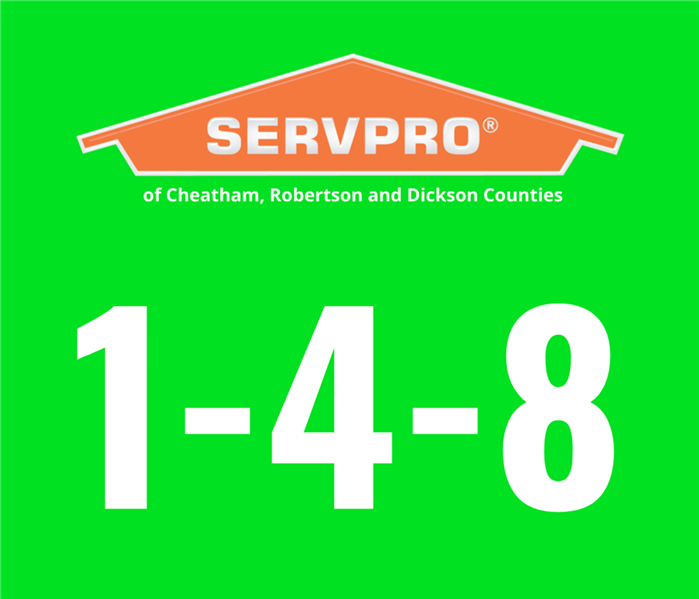 With fast response and our extensive training our SERVPRO® professionals are able to help control damage, recovery cost and downtime.
With fast response and our extensive training our SERVPRO® professionals are able to help control damage, recovery cost and downtime.
When your Robertson County home or business is affected by damage it is important to act fast! Here at SERVPRO® of Cheatham, Robertson and Dickson Counties we follow our 1-4-8 service guidelines to ensure that timely mitigation is top priority. With fast response and our extensive training our SERVPRO® professionals are able to help control damage, recovery cost and downtime.
SERVPRO® 1-4-8 Response Guidelines
1 HOUR – Within one hour of notice of loss, SERVPRO® of Cheatham, Robertson and Dickson Counties will contact you to arrange for service.
4 HOURS – Within four hours of loss notification, SERVPRO® of Cheatham, Robertson and Dickson Counties will be on site to start mitigation services (unless another time is requested)
8 HOURS – Within eight business hours, we will initiate a verbal briefing of the scope of damage and the mitigation efforts to you and your insurance carrier.
All SERVPRO® franchises are held to these guidelines set forth by SERVPRO® Headquarters. If you find yourself with a damage to your Robertson County home remember to call SERVPRO® of Cheatham, Robertson and Dickson Counties at 615-672-1905 to begin service.
Sump Pump Maintenance
4/24/2020 (Permalink)
Do you have a sump pump in your Robertson County home? Many homeowners keep sump pumps in their basements and crawlspaces. Did you know that sump pumps need to be maintenance regularly to ensure that they work properly? Below is a checklist for you to follow!
- Test the speed of the pump by pouring a bucket of water inside
- Remove dirt and debris (like mud and pebbles) in the sump pit to prevent clogging
- Ensure the float component can move freely
- Check drain lines for corrosion
- Go outside to make sure that water is being pumped away from the house
- Create a backup plan for power outages (like a battery or generator)
Don’t take your sump pump for granted and wait until your basement floods. If you do need assistance with a sump pump that has malfunctioned and flooded your home, call our office at 615-672-1905.
Spring Maintenance Tips
4/8/2020 (Permalink)
Spring has sprung and we are here to help with some tips to ensure that your Robertson County home is in tip top shape after the winter months.
Outside Water Sources
It is important that you check all outdoor water sources to make sure that have no dry rot or damage due to freezing. If you can stop the flow of water with your thumb, the pipe inside might be damaged.
HVAC Service
Having your HVAC system serviced will notify you of any problems with your unit as well as ensure that your unit is running efficiently.
Roof
Examine the roof carefully for any missing shingles or areas that have damage. Pay special attention to areas around skylights and the chimney.
Gutters
Look for loose or leaking gutters. Ensure that all downspouts are draining away from the foundation and that there is no debris lodged inside.
Concrete and Wood
Ensure that exterior concrete slabs drain away from the homes foundation and that there is no cracks within the concrete. Look for any rotted wood around exterior windows and doors and repair as needed to ensure that there is not continued damage.
SERVPRO® of Cheatham, Robertson and Dickson Counties is here to help. If you find that you need assistance with any of these spring maintenance tips call our office today at 615-672-1905.
Sumner County Flood Evacuation Emergency Kit
2/21/2020 (Permalink)
SERVPRO® of Cheatham, Robertson and Dickson Counties wants you to be prepared if a flood forces you to evacuate.
Some of these items can be kept in a waterproof container (your emergency kit). Medications probably cannot, but you can have them ready to bring with you.
If a flood in Cheatham, Robertson or Dickson Counties means you have to evacuate your home, you will need:
- Written contact list
- Copies of medical insurance & Medicare cards
- Warm blankets
- Extra clothing, especially socks & undergarments
- Bottled water
- Batteries for your electronic devices
Some people in Cheatham, Robertson or Dickson Counties will also need:
- At least one other person who can get your medications & supplies
- At least a week-long supply of prescription medicines
- A list of all medications, allergies, and dosages
- An extra pair of glasses or extra contact lenses
- Hearing-aid batteries
- Games & activities for children
If you have pets in your home, consider:
- Pet food and toys
- Toys or comfort objects
- Vet information
Some shelters will not or cannot allow pets. Ahead of an emergency, SERVPRO® of Cheatham, Robertson and Dickson Counties suggests you find out which ones will allow your 4-legged loved ones. All shelters allow service animals.
Prevent Water Damage Before It Happens – Tips From A Plumber
12/23/2019 (Permalink)
Water damage can be caused by many different things. Some are unavoidable and some could be possibly be prevented by taking the proper precautions. Plumbers see it all where water damages are concerned and have given 10 tips to aid in the prevention of water damage at your home or business.
- Know the Location of Shut-Off Valves
Note the location of the main shut off valves and drain in your home and business. In many cases the shut off will be located outside of your home or business. Apartments and condos may not have their own dedicated shut off valves.
- Don’t Puncture Pipes
Make sure that you have an idea of where your pipes are located in your walls. If you plan to drill holes or put nails into your drywall or flooring you could potentially puncture a pipe if you are unsure of their location. You may be able to locate pipes behind walls with an inexpensive stud finder.
- Find Out What’s Flushable
Flushing anything other than toilet paper is not advisable. There are flushable wipes on the market that also pose a risk of creating a backup.
- Don’t Put Garbage Down The Drain
Even if you have a garbage disposal, be gentle with the items that you place in the disposal. Many times disposals have build-up that forms from different foods that can cause a drain to backup.
- Take The Plunge
Invest in a high quality plunger to clear clogs in toilets, sinks and drains.
- Pull Out The Vacuum
One word. KIDS. If you are trying to dislodge a larger object such as a toothbrush or toy, don’t be afraid to pull out the wet-dry vacuum to assist. A plunger will lodge the item deeper into the drain causing it to become more difficult to remove.
- Don’t Ignore Leaks
Do you have a steady drip? Don’t wait to fix the problem causing the leak. That steady leak is causing a steady incline in your water bill. A leaky faucet can waste up to eight gallon of water per day.
- Never Over-Tighten Fittings
I tend to like to make sure things are nice and tight when I am completing home repairs. Don’t do that with your fittings and connections. Over tightening can lead to stripped screws and broken bolts. Remember, “Hand tight is just right”
9. Make Friends with Plumber’s Tape
Also called (Teflon Tape), plumbers tape is used to seal pipe threads to prevent leaks around joints and fittings.
- Always Check for Leaks
After every plumbing project, check for leaks by running water through the system. You can make adjustments before damage happens by doing this.
These helpful tips will aid in preventing water damage to your home or business, but will not protect your property 100% from unforeseeable problems. If you find yourself with damage to your home or business call our office today.
One of the Top Homeowners Insurance Claims
11/22/2019 (Permalink)
As a homeowner you secure homeowners insurance for a multitude of reasons. It is the smartest way to prepare for losses that could potentially occur in your home. The policy that is best for you and your family depends on your needs and your homes geographic location. A top rated insurance carrier rated water damage and weather related water damage as two of the Top Five most common causes of damage.
Water Damage can occur from appliances, plumbing and sewer failures and can cause a lot of damage to your home. According to the data from this carrier, non-weather related water damages make up roughly 20% of claims.
Water Damage can also occur from frozen pipes, leaky roofs and ice dams. These damages are costly and can cause extensive damage to your home as well. These are considered weather related and make up roughly 11% of the claims based on this carrier’s data.
If you find yourself with damage from one of the top five causes, give our office a call to begin remediation.
What Can Affect Repair Cost After a Water Damage?
11/5/2019 (Permalink)
Whether you have water damage from a storm or a faulty appliance, mitigating that damage and starting repairs in a timely manner is important. Depending on the cause and severity of damage the cost can range significantly to mitigate and complete repairs. Below are some factors that could affect the cost of repairs.
-The Areas Size-
As one might think, the larger the area of damage the larger the area of repairs. The larger the damage the more labor and material it takes to repair it correctly. Although, there are instances in which a smaller area of damage could result in more repair cost. Such as, working within a confined space or having to purchase more material than needed for the area due to the way in which it is sold.
-Whether the Water is Still Present-
Make sure that you have hired a reputable company to mitigate the water damage and ensure that the structure is completely dry before beginning repairs. You should not attempt to begin repairs until all of the structure has been dried thoroughly and all equipment removed.
-Damaged Materials-
If your home or business has costly materials and upgrades within then your repairs will be more costly. For instance, if you have sand and finish hardwood that was removed and needs to be replaced it will cost more than that of carpet for the same area. This is a big reason why it is a good idea to review your policy as well. If you have completed a lot of upgrades and done remodeling to your home over the years you want to ensure that you have the proper amount of coverage to cover any damages that might occur.
-Location-
Different areas have a different cost of living. The cost of living in California is much different than that of Kentucky or Tennessee. Make sure that you are hiring a trained professional from the area that you live or need the repairs to be completed.
-Timeline-
It is important that you begin mitigation to your damage as soon as you have discovered the damage. The longer you wait to mitigate the damage that occurred the more likely you are to have secondary damage occur that will result in a higher mitigation cost and therefore a higher repair cost.
If you find yourself in need of mitigation from water damage, fire damage, mold damage or storm damage call our office to schedule a free inspection today.
Which Washer Hose Is Right For You?
11/5/2019 (Permalink)
Most homeowners are not particularly picky when it comes to washing machine hook up. Is it hooked up? Does it work? Okay great! Unfortunately, the components that you choose to hook your washer up can impact your home and family more than you would like to think.
There are three different kinds of washing machine hoses that you can choose from.
Reinforced Rubber
These are the hoses that people are most familiar with. They are relatively inexpensive and easy to find. They are made of a polyester mesh that makes the rubber stronger and less likely to burst.
If your machine is located inside of your home these hoses are not recommended as they can burst. If your machine is located outside of the home these are a good solution for you.
Steel Braided
A stainless steel hose is the minimum hose style recommended for indoor use. They are not the cheapest that you can find as far as hoses are concerned, but the added safety is worth the extra money. A stainless steel braided hose is better than the basic rubber hose and meets a minimum standard when your washing machine is located inside.
Auto-Shutoff Hose
For a few more dollars you can have additional peace of mind using auto-shutoff hoses. These hoses have an auto shut off at one end as an added safety feature. These hoses provide the best safety features for added peace of mind.
Here are some helpful tips on hose installation and maintenance to help avoid hose failure.
-Ensure that you have the proper length hose. Do not force the hose to fit.
-Always allow ample space between the washing machine and the wall to avoid kinks.
-Inspect your hose regularly. At minimum you want to inspect your hose once yearly. A good rule of thumb is to inspect your hose when you inspect your smoke detectors at Daylight Savings Time.
-Shut water off when you are on vacation or away from the home for an extended period of time.
-Replace your washing machine hoses regularly. The manufacturer of your hose will state the average life expectancy and recommend when the hoses should be replaced.
I you find that your machine has been leaking over time when checking your hoses. Call our office to have an inspection of the damage.
Remember these emergency Do’s and Don’ts if you ever have a water damage in your Cheatham, Robertson or Dickson County home.
4/12/2019 (Permalink)
Taking proper action and following these steps until SERVPRO® of Cheatham, Robertson and Dickson Counties can arrive will help to reduce damage and increase the chances of successful restoration.
Emergency Water Damage Tips:
- Shut off the water source if possible or contact a qualified party to stop the water source.
- Turn off circuit breakers for wet areas of the building when access to the power distribution panel is safe from electrical shock.
- Remove as much excess water as possible by mopping and blotting.
- Place aluminum foil or wood blocks between furniture legs and wet carpeting.
- Move any paintings, art objects, computers, documents and other sensitive valuables to a dry place.
- Don’t enter affected areas if electrical outlets, switches, circuit breakers or electrical equipment are exposed to water. Always avoid electrical shock hazards.
- Don’t use your household vacuum cleaner to remove water; this could cause electrical shock o damage to the vacuum cleaner.
- Don’t turn on ceiling fixtures if ceiling is wet or enter rooms where ceiling are sagging from retained water.
If you find yourself with water damage to your Cheatham, Robertson or Dickson County home we are here to help. Call SERVPRO® of Cheatham, Robertson and Dickson Counties today!
Understanding Water Types-Damage From Clean Water
3/15/2019 (Permalink)
When you home or business suffers a water damage, understanding what type of water you are dealing with is critical to ensuring proper clean up.
Consider taking the following precautions to help minimize damage or prevent further damage while waiting for SERVPRO® of Cheatham, Robertson and Dickson Counties to arrive.
Damage from Clean Water
- Shut off water source if possible or contact a qualified professional to do so.
- Turn off circuit breakers for wet areas of the building if access to the power distribution panel is sage from potential electric shock. Do not enter rooms with standing water, as electrical shock hazards may exist.
- Remove as much excess water as possible by mopping and blotting. Wipe excess water from wood furniture after removing lamps and tabletop items.
- Remove and prop up wet upholstery cushions to allow more even drying.
- Move any paintings, art objects, computers, documents and other valuable items that may be sensitive to moisture to a safe place.
- Do not leave books, newspapers, magazines or other colored items on wet carpets or floors as they may cause staining.
- Do not use your household vacuum cleaner to remove water as there is potential for electric shock or causing damage to the vacuum cleaner.
- Do not turn on ceiling fixtures if the ceiling is wet; do not enter rooms where ceiling is sagging from retained water.
When you have a water damage, don’t leave your property to chance. Call SERVPRO® of Cheatham, Robertson and Dickson Counties at 615-672-1905.
SERVPRO® of Cheatham, Robertson and Dickson Counties 24-Hour Emergency Storm Damage Service
12/21/2018 (Permalink)
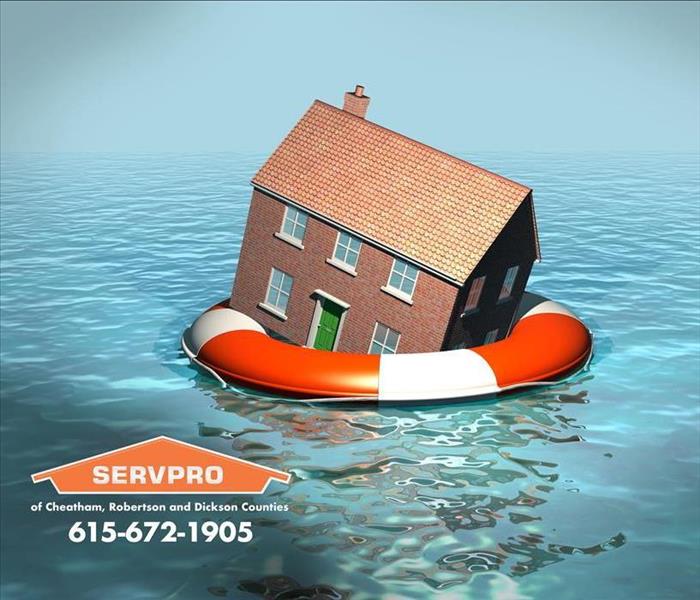 Contact your local agent today for a quote on flood insurance.
Contact your local agent today for a quote on flood insurance.
Water Damage and Insurance in Cheatham, Robertson and Dickson Counties
SERVPRO® of Cheatham, Robertson and Dickson Counties wants to create community awareness about the potential risk of flood and water damage. Here are some insurance tips from FEMA about flood insurance. Most insurance rates vary by company and the rules vary by state. Flood insurance is an exception.
Most property insurance does not cover flood damage.
Some homeowners’ policies will cover water damage if the damage came from:
- Sewer or drain backup
- Sudden and accidental damage from plumbing, heating systems or air conditioning
Additionally, some policies will also include mold remediation, but not if a flood caused the problem.
How to get flood insurance in Cheatham, Robertson and Dickson Counties
- Check whether your community participates in the National Flood Insurance Program (NFIP). You can still get flood insurance if you live in a low-risk area and many times the insurance will cost less if you live in a low-risk area.
- Find an insurance agent in Cheatham, Robertson and Dickson Counties. The NFIP is the only flood-insurance provider, but the government does not sell it. The NFIP sets the rates and you can purchase the policy through your local insurance provider.
- If your insurance agent is unaware of the NFIP, you can reach out to the help center at 800-427-4661
Resource Links:
usa.gov
FEMA
Water Damage Inside Edition – SERVPRO® Equipment
12/7/2018 (Permalink)
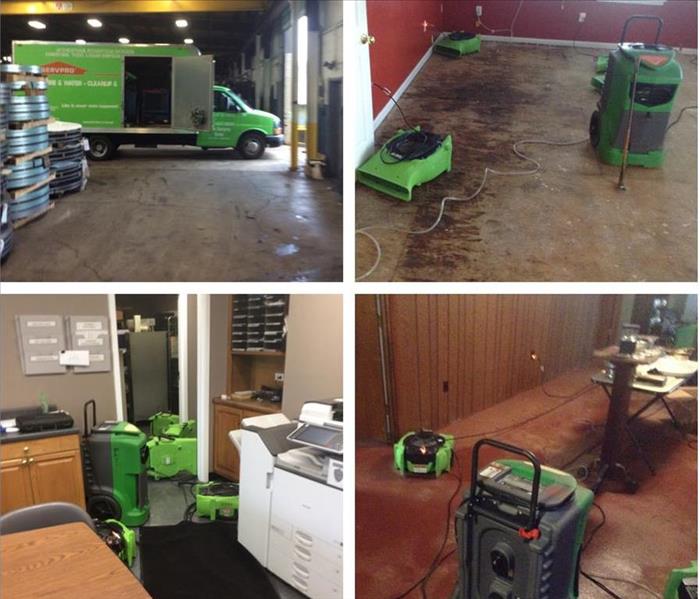 SERVPRO® of Cheatham, Robertson and Dickson Counties has state of the art equipment that is placed on site to assist in drying the structure.
SERVPRO® of Cheatham, Robertson and Dickson Counties has state of the art equipment that is placed on site to assist in drying the structure.
Although our wonderful team members play a valuable and important role in servicing our customers’ damages, SERVPRO® of Cheatham, Robertson and Dickson Counties has state of the art equipment that is placed on site to assist in drying the structure. Using the proper equipment makes a measurable difference in reducing claims loss expense. When time is of the essence, technology and equipment must be counted on to perform, our team of trained professionals at SERVPRO® of Cheatham, Robertson and Dickson Counties understand how to dry a structure and personal property effectively. Our team members are trained in Psychrometry, which allows them to evaluate air conditions in the structure and establish a drying plan.
Detection Equipment
Scoping a damage involves our trained team members locating the areas affected by water and determining the extent to which the structure and contents have absorbed moisture. Our trained team members use:
- Moisture Sensors – These are us to detect moisture in carpets, baseboards and walls.
- Moisture Meters – These are used to determine the actual moisture content of various materials. The moisture tester provides accurate moisture readings that enable our SERVPRO® of Sumner County team member to monitor the drying process.
- Thermohrgrometers – These measure both temperature and relative humidity. In capturing these two readings our trained team members calculate specific humidity, dew point and vapor pressure.
Extraction Equipment
The most effective method of removing moisture from a structure is extraction. This is why it is crucial to respond quickly to a water damage and to provide emergency mitigation services. When the water is extracted quickly, the environment can usually be dried much faster.
- Extractors – These are used in cleaning carpets and upholstery and in removing water from floors following a water damage. Extractors can either be truck-mounted or portable, allowing for greater access inside structures.
Air Moving Equipment
Air movers are used in water damage restoration to enhance evaporation at the surface level, thereby reducing drying time. As airflow at the surface level increases, the moisture in the air increases. This moisture is then eliminated via the use of dehumidification equipment.
Dehumidification Equipment
By extracting water vapor from the air, dehumidifiers lower the relative humidity, which in turn increases the rate of evaporation. In a water damaged, structure, dehumidifiers pull in the moist, humid air and then discharge dry, warm air. The dry air acts like a sponge, absorbing moisture from wet materials. SERVPRO® of Cheatham, Robertson and Dickson Counties uses two types of dehumidifiers:
- Refrigerant Dehumidifiers – These work similarly to an air conditioner.
- Desiccant Dehumidifiers – The use chemicals, called desiccants, which readily absorb moisture from the air.
Understanding Water Types-Damage From Contaminated Water
11/19/2018 (Permalink)
When you home or business suffers a water damage, understanding what type of water you are dealing with is critical to ensuring proper clean up.
Consider taking the following precautions to help minimize damage or prevent further damage while waiting for SERVPRO® of Cheatham, Robertson and Dickson Counties to arrive.
Damage from Contaminated Water
- Avoid all contact with sewage and items contaminated by sewage. Wash your hands thoroughly if you come in contact with contaminated items.
- Do not walk through contaminated areas, as you could spread damage to unaffected areas.
- Do not turn on the HVAC system if there is a possibility of spreading contaminated air.
- Do not use household fans to dry the structure; air flow could spread contaminates.
- Discard any food and/or products for personal hygiene and cleanliness if exposed to the contaminated areas.
When you have a water damage, don’t leave your property to chance. Call SERVPRO® of Cheatham, Robertson and Dickson Counties at 615-672-1905.
Drying Equipment Stats
10/25/2018 (Permalink)
If you have a water damage in your Cheatham, Robertson or Dickson County home you want the restoration company that completes the dry out to have adequate equipment to take care of the job set before them. SERVPRO® of Cheatham, Robertson and Dickson County takes great pride in ensuring that their equipment is kept in good working condition and up to industry standard. Some of the key factors that we look at when purchasing or replacing drying equipment are:
Power-
In air movers we look at the CFM (Cubic Feet per Minute). This is important because it calculates the amount of air flow that can be provided over a certain amount of space per minute. This will help with determining dry time based on the amount of water that has been dispersed onto an area. In dehumidifiers we look at the PPD (Pints per Day). This is how much moisture/humidity is pulled from the air during the drying process.
Low Amps-
Older equipment pulls more amperage to run than newer equipment. Each plug (depending on the type) allows for so much amperage to be pulled by what is plugged in. If you plug in two pieces of equipment and combined they are pulling more amperage than the plug or circuit can offer you will trip breakers and essentially be required to set a generator to adequately power the equipment needed.
Durability-
Moving equipment around from job site to job site can often times take its toll. The long term durability is very important to ensure that we always have reliable equipment to place on job sites.
Safety-
In all of our equipment we look to ensure that it has been tested and meets the requirements of a NRTL (Nationally Recognized Testing Laboratory). It is very important to our company that our employees and customers are safe around our equipment.
If you have a water damage in your Sumner County home call SERVPRO® of Cheatham, Robertson and Dickson County for your restoration needs.
24 Hour Emergency Water Damage Service
10/19/2018 (Permalink)
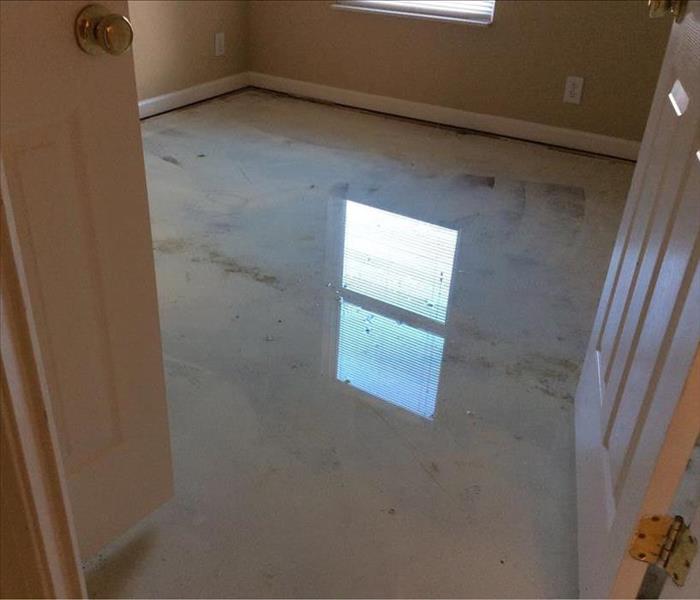 Call 615-672-1905 today, if you are in need of services.
Call 615-672-1905 today, if you are in need of services.
SERVPRO of Cheatham, Robertson and Dickson Counties is available 24 hours a day for water emergencies, large or small. When you are dealing with water damage, immediate action is crucial. A delay of just a few hours can greatly increase the severity of the water damage.
We Answer the Phone Ready to Help
Call Today - 615-672-1905
We understand that when you call us, you may be feeling confused, stressed and vulnerable. You need an expert to guide you through this crisis. SERVPRO of Cheatham, Robertson and Dickson Counties has the specific water damage training and experience to help you through this tough time. We specialize in water damage restoration-in fact, it’s the cornerstone of our business.
What to Expect
When you call we will ask several questions regarding your water damage emergency. These questions will help us determine what equipment and resources to bring, including how many trained SERVPRO Professionals may be needed.
Our SERVPRO Representative will ask several questions:
- Your name and contact information
- Your insurance information
- The street address of the water-damaged home or business
- When did the flooding or water damage occur?
- What caused the water damage?
- Is there electricity available?
About SERVPRO of Cheatham, Robertson and Dickson Counties
SERVPRO of Cheatham, Robertson and Dickson Counties specializes in the cleanup and restoration of commercial and residential property after a water damage event. Our staff is highly trained in property damage restoration. From initial and ongoing training at SERVPRO’s corporate training facility to regular IICRC-industry certification, rest assured our staff is equipped with the knowledge to restore your property.
Continuing Education Course Credits for White House Insurance Agents and Adjusters
10/7/2018 (Permalink)
SERVPRO® of Cheatham, Robertson and Dickson Counties held a Continuing Education Course on September 13th for our local insurance agents and adjusters. We covered Restorative Drying for Water Damage, which is a 4 hour course and provided all attendees that stayed for the duration 4 credit hours. Cory Sullins teaches the courses and makes them very interactive and engaging.
SERVPRO® of Cheatham, Robertson and Dickson Counties offers these classes free of charge. Also included in the course is a catered lunch and a light breakfast. You don’t want to miss out on these courses! We try to offer 3-4 courses each year, if you are in need of credit hours for your licensure call our office today at 615-672-1905 to see when our next course is scheduled.
Water Damage to Your Cheatham, Robertson or Dickson County Home
9/26/2018 (Permalink)
Imagine it’s 8:00 p.m. on a Sunday,
and you walk into your home after a relaxing vacation expecting to switch on the lights, put the kids in bed and get some rest yourself.
The only problem? A water pipe burst over the weekend, dumping thousands of gallons of water over your hardwood kitchen floor, your carpeted living room and your cement utility room. You realize this problem is far beyond the reach of your shop vac. What do you do now?
When it is your Cheatham, Robertson or Dickson County home that is underwater, mitigation cannot wait. You need mitigation to begin immediately. If water damage strikes your home, call SERVPRO® of Cheatham, Robertson and Dickson County any time, any day.
The cost of water damages can increase exponentially with time. Wood floors warp, dry wall soaks in moisture and mold develops in hard-to-reach areas of your home.
The benefits of rapid mitigation offered by SERVPRO® of Cheatham, Robertson and Dickson County are two-fold: Your costs go down as potential hazards may be avoided, and your peace of mind goes through the roof.
If the unthinkable happens to your Sumner County home, allow SERVPRO® of Cheatham, Robertson and Dickson County to help quickly turn your “before” into a “happily ever after.”
SERVPRO of Cheatham, Robertson and Dickson Counties Water Damage Process Overview
6/29/2018 (Permalink)
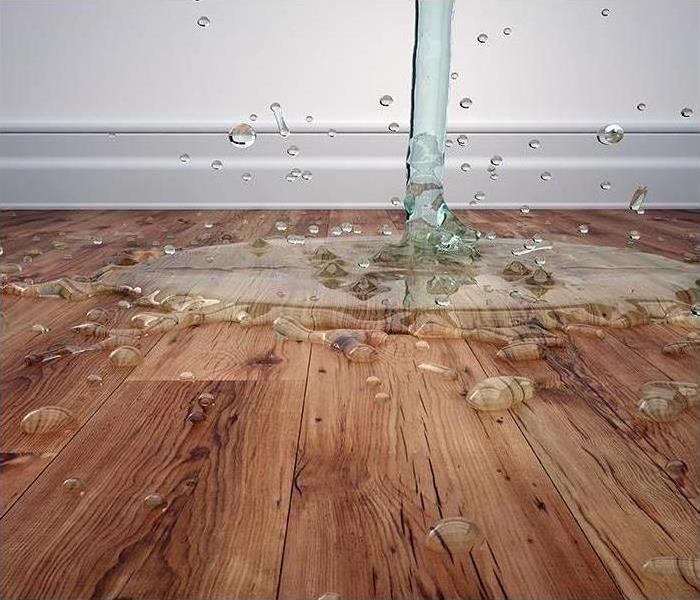 If you are ever in need of water damage services call our SERVPRO of Cheatham, Robertson and Dickson Counties office at 615-672-1905.
If you are ever in need of water damage services call our SERVPRO of Cheatham, Robertson and Dickson Counties office at 615-672-1905.
Here at SERVPRO of Cheatham, Robertson and Dickson Counties we strive to provide excellent communication and prompt service to our customers. When we receive notification of damage to a customer’s home we understand that they are most times distressed and unsure of the mitigation process that is about to unfold. Below is a bird’s eye view of the process that we follow for water damages.
One Hour:
Within one hour from notice of loss; SERVPRO of Cheatham, Robertson and Dickson Counties will contact you to arrange for service. During this call our trained office staff will ask important questions regarding your damage, insurance information and any additional contact information that is needed.
Four Hours:
Within four hours of loss notification; SERVPRO of Cheatham, Robertson and Dickson Counties trained technicians will be on-site to start mitigation services. The key to reducing damage and saving money is responding quickly to your damage.
Detailed Explanation:
A trained, uniformed and equipped SERVPRO of Cheatham, Robertson and Dickson Counties professional will walk you through the job process step-by-step, explaining what to expect and the anticipated outcome. All damages are different and our on-site personnel will ensure that you are aware of each aspect of your damage.
Pretesting:
A SERVPRO of Cheatham, Robertson and Dickson Counties professional will begin pretesting for restorability, working from the source of the damage outward. Water travels through different materials at different speeds. What might look like a small damage could have moved to another portion of the home via the materials that are wet.
Eight Hours:
Within eight business hours of on-site arrival, a verbal briefing of the scope will be communicated to the appropriate individual, most times your insurance adjuster or property manager.
Cleaning & Restoration:
SERVPRO of Cheatham, Robertson and Dickson Counties will work neatly and efficiently to help your regain control of your property when a damaging event has occurred. Our certified teams will use state-of-the-art restoration techniques to ensure that your property is taken care right the first time.
Final Walk-Through:
After the work has been completed, a final walk-through will be conducted with you to help ensure your satisfaction.
If you are ever in need of water damage services call our SERVPRO of Cheatham, Robertson and Dickson Counties office at 615-672-1905.
Black Water
11/17/2017 (Permalink)
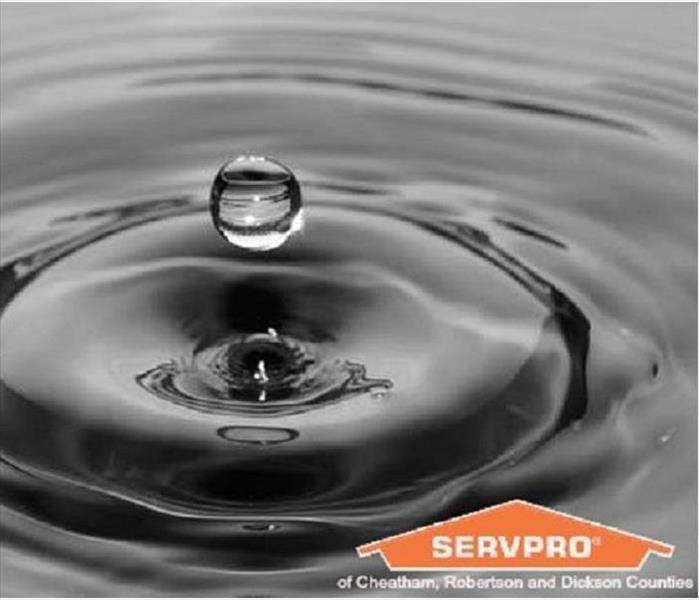 Category 3 water, although referred to as Black Water or Dirty Water is not always visually black or dirty.
Category 3 water, although referred to as Black Water or Dirty Water is not always visually black or dirty.
Black Water
In the restoration industry there are three categories of water and as industry professionals it is our job to determine which category of water each damage has. The most severe category is Category 3 which is also commonly called CAT 3, Black Water or Dirty Water. Category 3 water (Black Water) is highly contaminated water that is potentially toxic to anyone inside the dwelling.
The water is considered category 3 (Black Water) if it meets any of the following criteria. Sources include sewage backup, flooding from rivers or streams, toilet overflow with feces or stagnant liquid that has begun to support bacterial growth. If Category 1 or Category 2 has been left untreated for more than three days, it is likely that it will develop into Category 3 (Black Water). If your damage is deemed as Category 3 (Black Water), it is likely that many pieces of your property will need to be replaced. Anything porous, such as furniture, carpeting and drywall is grossly contaminated. Category 3 water, although referred to as Black Water or Dirty Water is not always visually black or dirty. In fact, most times it is completely translucent.
If you are ever faced with damage to your home act fast, find your source and call the professionals at SERVPRO of Cheatham, Robertson and Dickson Counties. We will assess the damage and ensure that it is properly mitigated to ensure your safety.
Understanding Content Coverage
10/31/2017 (Permalink)
 The best way to determine if you have enough content coverage is to conduct a home inventory.
The best way to determine if you have enough content coverage is to conduct a home inventory.
Understanding Content Coverage
Everyone has homeowners insurance right? It’s one of those things you have and hope you never have to use right? So, what happens if you do have to utilize coverage because of a damage?
Unfortunately, because homeowners insurance is necessary many homeowners rely solely on their agents to choose a policy that is right for them. This is totally fine, and works in many cases, but being educated on what your policy includes and doesn’t include is important.
Most policies are written and cover to repair or rebuild your home after damage. But what about ALL of the personal belongings inside of your home? Generally, your content coverage is 50 to 70 percent of the coverage that you carry on the structure of your home. In most cases this is a sufficient amount to cover personal items that are damaged, but in some cases it isn’t.
The best way to determine if you have enough content coverage is to conduct a home inventory. This is a much easier task thanks to modern technology. Walk through your home room by room and photograph all personal belongings. (TIP-If you picked your home up and turned it upside down, all items that would fall out are considered contents.) Open drawers and closets to photograph all items inside. You can catalog these items and keep them at an offsite location or you can download an app such as DreamVault and access it from any mobile device. This particular app is designed to house photos and information pertaining to each individual item, such as price, model and serial number. There is also a speech to text feature to help with documentation.
If you have jewelry, collector’s items, art or firearms, sometimes your coverage can fall short. Keep that in mind when documenting all items and reviewing your policy. If you find that your coverage is lacking you can generally purchase additional coverage or a rider for certain items.
When you have had damage to your home and personal belongings, you don’t want to worry with the added stress of insufficient coverage. Ensure that you are covered.
If you have damage to your home and/or personal items we are here to help. Call our office and we will walk you through the process and make your damage "Like it never even happened".
Dickson Residents: We Specialize in Flooded Basement Cleanup and Restoration!
2/14/2017 (Permalink)
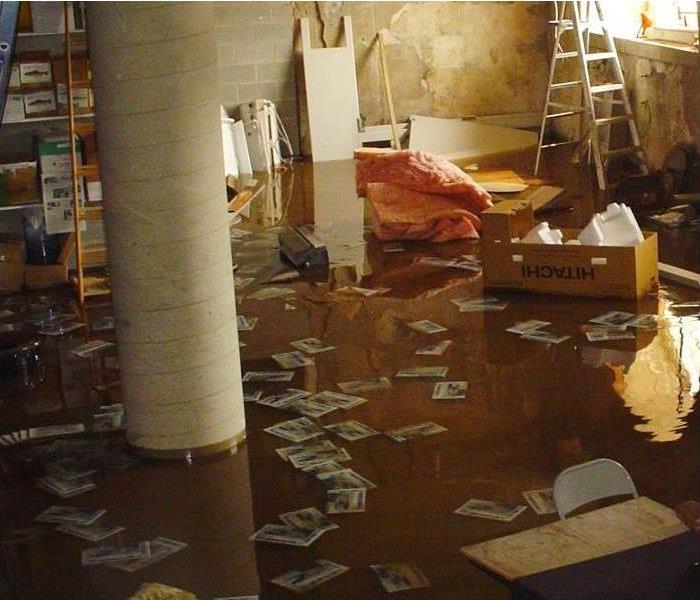 This Dickson home’s basement flooded due to heavy rains.
This Dickson home’s basement flooded due to heavy rains.
A basement can flood at any time, although flooding most often occurs during heavy rainfall. Basements are inherently prone to flooding because they are the lowest level of a building and are normally built partly or entirely below ground level. There are a number of reasons why your Dickson basement could flood, including:
- A blocked or failed sewer lateral pipe
- Heavy rain causes surface water to pool around your home
- Storm sewer backup
- Sanitary sewer backup
- Foundation drainage failure
- Water supply-line break or hot-water tank failure
- And many more
Have Questions about Basement Flooding?
Call Today – (615) 446-7626
If flood water is not handled quickly and properly, it can jeopardize your health and safety, and cause severe damage to your home’s structure. Remember, the longer you wait, the worse the problem will get.
The bottom line: a flooded basement can jeopardize your health, safety, and your home’s integrity. It’s worth making a call to SERVPRO of Cheatham, Robertson and Dickson Counties and let our trained, professional crews handle the situation safely and correctly. We have earned the trust of hundreds of homeowners, business owners, and property professionals.
We are Flooded Basement Specialists:
- We are Available 24 hours/7 days per week
- We’re a Preferred Vendor to many National Insurance Companies
- We Bill The Insurance Directly – One Less Thing For You To Worry About
- Our Technicians are Highly-Trained in Water Restoration Techniques
- We use s500 IICRC Restoration Standards
- Advanced Inspection and Extraction Equipment
Basement Flooded? Call Us Today – We’re Here To Help! (615) 446-7626
Dickson 24 Hour Emergency Water Damage Service
12/21/2016 (Permalink)
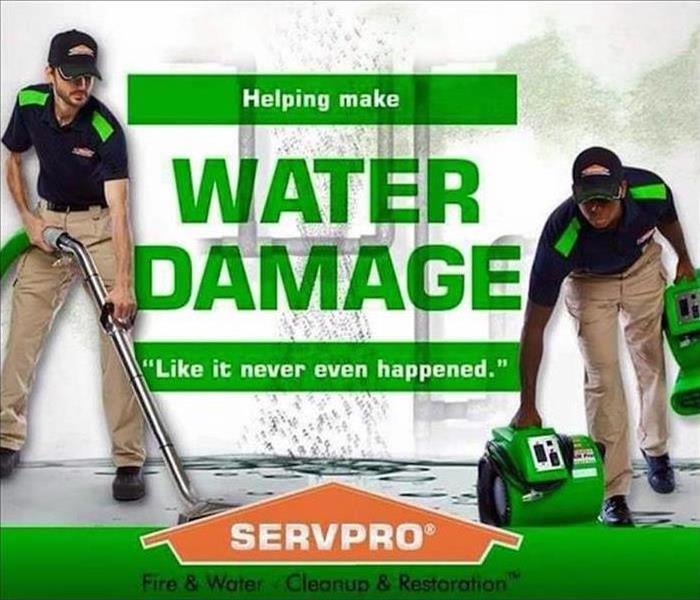 SERVPRO of Cheatham, Robertson and Dickson Counties provides 24 hour fire and water damage restoration service in Dickson.
SERVPRO of Cheatham, Robertson and Dickson Counties provides 24 hour fire and water damage restoration service in Dickson.
SERVPRO of Cheatham, Robertson and Dickson Counties is available 24 hours a day for water emergencies, large or small. When you are dealing with water damage, immediate action is crucial. A delay of just a few hours can greatly increase the severity of the water damage.
We Answer the Phone Ready to Help.
Call Today - (615) 672-1905
We understand that when you call us, you may be feeling confused, stressed, and vulnerable. You need an expert to guide you through this crisis. SERVPRO of Cheatham, Robertson and Dickson Counties has the specific water damage training and experience to help you through this tough time. We specialize in water damage restoration—in fact, it's the cornerstone of our business.
What to Expect
When you call, we will ask several questions regarding your water damage emergency. These questions will help us determine what equipment and resources to bring, including how many trained SERVPRO Professionals may be needed.
Our SERVPRO Representative will ask several questions:
- Your name and contact information
- Your insurance information (if applicable)
- The street address of the water-damaged home or business
- When did the flooding or water damage occur?
- What caused the water damage (if known)?
- Is there electricity available (on-site)?
About SERVPRO of Cheatham, Robertson and Dickson Counties
SERVPRO of Cheatham, Robertson and Dickson Counties specializes in the cleanup and restoration of residential and commercial property after a fire, smoke or water damage event. Our staff is highly trained in property damage restoration. From initial and ongoing training at SERVPRO’s corporate training facility to regular IICRC-industry certification, rest assured our staff is equipped with the knowledge to restore your property.
Meet Our Team - Click Here
Certifications
- WRT - Water Damage Restoration Technician
- ASD - Applied Structural Drying Technician
- UFT - Upholstery & Fabric Cleaning Technician
- ASCS - Air Systems Cleaning Specialist
- SRT - Fire & Smoke Damage Restoration Technician
- OCT - Odor Control Technician
- CCT - Carpet Cleaning Technician
- RRRP - Lead-Based Paint Activities and Renovation
- IICRC Certified Firm
- RRT - Carpet Repair & Reinstallation Technician
- OSHA - 10-hour General and/or Construction Industry Training Program
- CVI - Certified Ventilation Inspectors
- OSHA - 30-hour General and/or Construction Industry Training Program
- ECTP - Employee Certification Training Program
Protect Your Springfield Home from Frozen Pipes
12/14/2016 (Permalink)
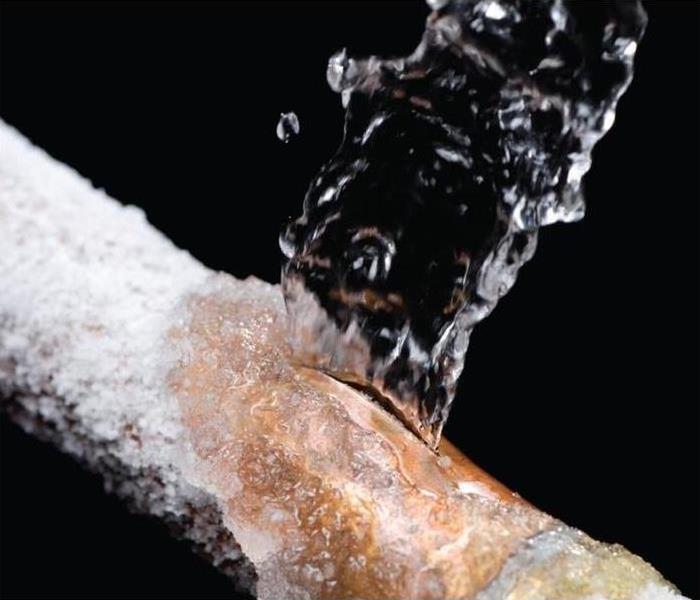 Prevent pipes from freezing in your Springfield home this winter.
Prevent pipes from freezing in your Springfield home this winter.
Avoid Frozen Pipes in Springfield
While the winters in Middle Tennessee may not be as bad as some other areas of the country, they're still nothing to ignore. Cold weather can have a huge impact on your home or business if you're not prepared. One of the most damaging and costly problems with frigid temperatures is the potential for frozen water pipes.
How and Why Pipes Freeze
As most of us know, when water freezes, it expands - anyone who has ever left a water bottle in their freezer overnight can tell you that. We often overlook or forget about the potential of the water in the pipes at our house freezing. However, in cases of extremely cold temperatures, that's exactly what can happen. As the water in your pipes expands as it freezes - and just like the frozen water bottle, it becomes bloated. These pipes will burst if they expand beyond their capacity, and water will begin to leak once it thaws.
Another thing to keep in mind is areas that are exposed to colder temperature are more susceptible to frozen or broken pipes. These areas include crawl spaces, attics, garages, and even the exterior walls of your home.
How to Prevent Pipes from Freezing
While you cannot control the weather, you can take steps to be prepared and help take the sting out of winter weather. Below are some tips and tricks to help you prevent water pipes from freezing at your property.
- Allow water to drip from faucets when temperatures dip below freezing. Moving water is less likely to freeze.
- If pipes are under a cabinet, leave the cabinet doors open allowing warm inside air to circulate around the pipes.
- Use insulated covers or wrap towels around any outdoor faucets. Shut off the water to these faucets if you have the ability to do so.
- Close the exterior vents of your crawl space. This will keep the area and pipes inside it a little bit warmer.
- Inspect the pipes in your crawl space and attic to ensure they are well insulated.
By utilizing these tips and taking the proper precautions now, you could save yourself a lot of money and headaches later.
For more information about preventing frozen pipes at your home or business, please call SERVPRO of Cheatham, Robertson and Dickson Counties at (615) 672-1905.
Faster To Any Size Water Damage in Dickson
8/27/2016 (Permalink)
Flooding and water damages are never convenient and don’t wait for regular business hours – thankfully neither do we. SERVPRO of Cheatham, Robertson & Dickson Counties provides emergency water damage mitigation and restoration services 24 hours a day, 7 days a week – including all holidays. We will respond immediately day or night.
Water is particularly invasive, and it will spread very quickly throughout your property. It will be absorbed into your floors, walls, furniture, etc. Therefore, water damages require immediate action, and quick response helps to minimize the damage and the cleaning and restoration costs. SERVPRO of Cheatham, Robertson & Dickson Counties will arrive quickly and start the water extraction process almost immediately.
Below is a Water Damage Timeline that shows how damage will progress if it’s not addressed quickly:
Water Damage Timeline
Within Minutes:
- Water quickly spreads throughout your property, saturating everything in its path.
- Water is absorbed into walls, floors, upholstery and anything else it touches.
- Furniture finishes may start to bleed, causing permanent staining on carpets.
- Photographs, books, magazines and other paper goods located on the floor will begin to swell.
1 - 24 Hours:
- Drywall begins to swell and break down.
- Furniture begins to swell and some may possibly crack.
- Dyes and inks from cloth and paper goods spread and stain.
- A musty odor will begin to appear.
48 Hours to 1 Week:
- Mold and mildew may begin to grow and spread.
- Doors, windows and studs will begin to swell and warp.
- Metal begins to rust and corrode.
- Furniture may begin to warp and show signs of mold.
- Paint begins to blister.
- Hardwood flooring begins to swell and warp.
- Serious biohazard contamination is possible at this time.
More Than 1 Week:
- Restoration time and cost increase dramatically, and replacing contaminated materials and structural rebuilding may be extensive.
- Structural safety, mold growth and biohazard contaminants pose serious risks to occupants.
Need Emergency Service? Call Us 24/7 - (615) 672-1905
Having Your Springfield Water Damage Handled by Certified Professional: Why It Matters
8/4/2016 (Permalink)
 IICRC Certified Firm Logo from http://www.iicrc.org/
IICRC Certified Firm Logo from http://www.iicrc.org/
Doctors have the American Medical Association, attorneys have the American Bar Association, and water damage restoration professionals have the Institute of Inspection, Cleaning, and Restoration Certification (or IICRC).
When you have a water damage in your Springfield home or business, your emotions can range from frustrated to absolutely frantic. You may be thinking to hire the first person you can find with a 'shop vac' to take care of the damage - however, it's important to have an IICRC Certified Firm like SERVPRO of Cheatham, Robertson and Dickson Counties take care of the damage. Each one of our technicians is a certified water damage restoration technician (WRT), and each one of our production managers is certified in applied structural drying as well (ASD).
Why It Matters
Because SERVPRO of Cheatham, Robertson and Dickson Counties is an IICRC certified firm - we handle all water damages in accordance with the ANSI/IICRC S500 Water Damage Restoration Standard. This ensures that you will receive outstanding, technically correct service, every time.
The explanation below from the IICRC's website describes the benefits of using an IICRC Certified Firm.
"More than just removing excess water, IICRC-certified restorers have the knowledge and equipment to further dry a home or facility (including substructure materials) completely back to pre-loss conditions. Through timely response and the careful monitoring of water damage, mold and other health issues can be prevented. If water damage has been present too long, mold will occur.
All IICRC-certified professionals have the training and experience to identify moisture sources, evaluate mold growth (visible or suspected), contain damage, remove contamination and dry materials to ensure that mold will not return."
If your property suffers a water damage, be sure to call the Certified Professionals at SERVPRO of Cheatham, Robertson and Dickson Counties at (615) 672-1905.
Information above provided by http://www.iicrc.org/
Water Damage in Springfield? We're Faster to Any Disaster
6/6/2016 (Permalink)
There's no such thing as a small water damage in Springfield - especially when the water you don't see contains bacteria or can cause mold, rot and other unseen damage. Water damage can affect the value of your property. Before you get out the mop bucket and try to clean it yourself, consider how the damage can affect your property.
At SERVPRO of Cheatham, Robertson & Dickson Counties, we know how disruptive water damage can be for your home or business. We are trained and equipped to manage the drying process. By utilizing the proper equipment and moisture measuring devices, your home or business will be quickly and thoroughly dried to industry standards. With rapid response time and a full line of water cleanup and restoration services, SERVPRO of Cheatham, Robertson & Dickson Counties can help you regain control quickly, ensuring your facility and its contents are properly dried deodorized and protected.
Before you risk further damaging the value of your Springfield home or facility by attempting to clean up the mess yourself, call SERVPRO of Cheatham, Robertson and Dickson Counties.
Prevent Water Damage in your Ashland City Home This Spring by Watching for Sump Pump Failures
5/19/2016 (Permalink)
Sump pumps are headache savers when it comes to saving our Ashland City basements from flooding whenever a downpour occurs. The sump pump sits in the lowest part of our basement or crawlspace and is automatically activated when it detects that there is water starting to fill up the hole it is sitting in. As the pump runs, it sends the water out of the discharge line and away from the home making sure that the home does not flood. Like any other mechanical device, sump pumps still have the possibility of failing.
Causes of sump pump failure
- Power failure – The most common cause for failure of a sump pump is a power outage. As we know, most power outages happen when we need the sump pump most, during a storm. Purchasing a backup generator to keep your sump pump moving during a storm can save your home from a flooded basement.
- Improper installation – The installation of a sump pump is crucial to it working properly. One mistake or misstep in following the manufacturer instructions can lead to water to be displaced. Make sure to follow the manufacturer’s manual or consult a professional to make sure the sump pump is installed correctly.
- Frozen or clogged discharge line – The discharge line is where the water exits the home. It is important to make sure that the line is protected from freezing and does not have debris such as dirt, rocks and sticks. A grated discharge line will give water a separate way to flow in case of a blockage.
- Lack of maintenance – Manufacturers recommend testing and running the pump every 2-3 months.
- Switch problems – The purpose of the sump pump is to automatically turn on when a sensor notices that there is water build up. If the pump gets shifted and moves position inside of the basin, it can cause switch to be inaccurate and not know where the correct water level is, making the pump not switch on at the correct time.
- Manufacturer defect – Although it is rare to get a bad machine right out of the store, it still is possible. It is important to test the pump after installation to ensure that it is running properly so that you aren’t finding the defect when it is already too late.
Source - http://renewservices.com/7-causes-of-sump-pump-failure-what-to-do/
Understanding Water Damage Types in White House
3/4/2016 (Permalink)
When your White House home or business suffers a water damage, understanding what type of water you are dealing with is critical to ensuring proper cleanup. There are three types of water. Clean water is water from a broken pipe, or other water source; rainwater is also considered clean. The term gray water is used to classify slightly contaminated water. Clean water becomes gray water when it is left untreated allowing bacteria and other contaminants to begin growing, making the water hazardous. Black water is highly contaminated and filled with fungi, bacteria, chemicals and more. Black water is typically caused by sewage damage, flooding or any type of natural disaster. Black water should always be handled by trained professionals.
Consider taking the following precautions to help minimize damage or prevent further damage while waiting for help to arrive:
Damage from Clean Water
- Shut off the water source if possible or contact a qualified professional to do so.
- Turn off circuit breakers for wet areas of the building if access to the power distribution panel is safe from potential electrical shock.
- Remove as much excess water as possible by mopping or blotting. Wipe excess water from wood furniture after removing lamps and table top items.
- Remove and prop up wet upholstery cushions to allow more even drying.
- Move any paintings, art objects, computers, documents and other valuable items that may be sensitive to moisture to a safe place.
- Do not leave books, newspapers, magazines or other colored items on wet carpets or floors as they may cause staining.
- Do not use your household vacuum cleaner to remove water as there is a potential for electrical shock or causing damage to the vacuum cleaner.
- Do not turn on ceiling fixtures if ceiling is wet; do not enter rooms where ceilings are sagging from retained water.
Damage from Contaminated Water
- Avoid all contact with sewage and items contaminated by sewage. Wash your hands thoroughly if you come in contact with contaminated items.
- Do not walk through contaminated areas, as you could spread damage to uncontaminated areas.
- Do not turn on the HVAC system if there is a possibility of spreading contaminated air.
- Do not use household fans to dry the structure; air flow could spread contaminants.
- Discard any food and/or products for personal hygiene and cleanliness if exposed to the contaminated areas.
When you have a water damage, don't leave your property to chance. Call SERVPRO of Cheatham, Robertson & Dickson Counties.
Protect Your Home in Dickson from Frozen Pipes this Winter
1/8/2016 (Permalink)
 Image Source: engineeredconstruction.com
Image Source: engineeredconstruction.com
In Dickson County, the winter always seems to creep up on us. The weather outside turns from cool and moderate, to absolutely freezing seemingly overnight. To combat these frigid temperatures, we protect ourselves by budling up in layers of clothing, turning on the heat in our homes and spending more time inside. However we often don't think about the protection of our home during the winter months. The frigid temperatures that can chill us to the bone can also do a number on indoor plumbing. Below we've listed some tips to protect your home in Dickson and avoid frozen pipes this winter.
1. Insulate your pipes
The pipes located in your crawlspace, basement, attic and exterior walls are particularly vulnerable to freezing temperatures. Protect these pipes by properly insulating them using snap-on foam insulation or even towels.
2. Drip faucets
During cold days and nights, it helps to let your faucets drip both hot and cold water to avoid pressure build-up and keep the water moving to prevent freezing.
3. Open kitchen & bathroom cabinets containing plumbing
As a general rule, when you drip your faucets open the cabinet doors beneath them as well. This allows the heat from your home to better circulate around the pipes in these areas.
5. Close vents to crawlspace
If you have a crawlspace, be sure to close the vents to ensure this area is as warm as possible
5. Check foundation
Having cracks in your foundation walls can all cold weather in and make it more likely for pipes to freeze. Fill the cracks with caulking or expanding foam.
When water damage occurs in Cheatham, Robertson or Dickson County spring into action
6/19/2015 (Permalink)
Take Fast Action When Springfield Water Damage Occurs
If your home is flooded, then you need to spring into action. It is important that water removal is accomplished in a timely manner to prevent damage to your home. There are other problems that water causes such as unhealthy indoor air quality. You can physically remove wet items and carry them outdoors to dry. A large fan will help with water removal in Ashland City, Springfield, Dickson White House and Greenbrier to dry items faster. High humidity levels can affect every member of your family in a negative manner. If you have family members with respiratory problems, then it is important that you get rid of excess water.
Consider hiring a company that specializes in water damage. They will bring professional equipment that will dry your home faster. This is important to prevent damage to your floors, walls and ceilings. Protect yourself and your family by wearing a respiratory mask while cleaning up after water damage. Throw away items that have been saturated with water such as mattresses, rugs and carpets.
Water damage can also occur due to damaged water or sewer lines. If the sewer has backed up into your home, you must take steps to prevent bacteria from entering your home. Consult a professional water damage company for best results. Consult with your insurance agent to find out what items are covered. Some homeowner's policies do not cover damage due to flooding or other disasters. Prepare ahead of a disaster by storing items such as canned foods and important papers inside plastic containers and bags. Important information such as insurance policies should also be protected.
If your area weather station is reporting possible flooding in your area, then you should unplug all appliances. Turn the electricity off before you vacate the premises. It is important to prepare ahead for natural disasters that can catch you off-guard. Make sure all family members know what to do in case of an emergency. Never use your household vacuum to remove excess water. A professional water damage company has equipment to remove water safely and efficiently. Contact a professional before an emergency situation unfolds in front of you and your family.
SERVPRO of Cheatham, Robertson & Dickson Counties’ Professionals provide fire and water damage restoration services. SERVPRO of Cheatham, Robertson & Dickson Counties proudly serves Springfield, Dickson, White House, Ashland City, Greenbrier, Pleasant View and surrounding areas. We are available 24 hours/7 days a week and are ready to restore damage to your home or structure caused by:
Dickson Water DamageSpringfield Fire DamageAshland City Flood DamageWhite House Mold Damage
Dealing with Water Damage in Cheatham, Robertson or Dickson Counties
5/29/2015 (Permalink)
Dealing with Water Damage
Water damage is traumatic, often to homeowners as much as their house. The first time you see the water damage is a shock; you may not know where to start in repairing it. However, there are steps you can take in the immediate time after a flood, burst pipe, or other damage that will make it easier to repair your home and move on with your life.
1. Stop the influx of water. You cannot repair water damage while water is still entering your home. If there is a pipe leak or other repair issue, turn off the water supply and have the problem repaired. If the damage is from a storm or flood, use sand bags or other ways of reducing the water. In some cases, people have to wait out the deluge when water damage is caused by a natural disaster.
2. Call your insurance company. It is important to know from the beginning what types of water damage your insurance company covers, as well as whether they will cover water removal and other services. Even if this is not an incident covered by your homeowner’s insurance policy, your insurance agent can still offer you advice.
3. Dry out your home. Standing water and wet upholstery can breed dangerous microbes in just 24 hours, so fast water removal is crucial to your future health. Mop or use a wet vac, bag up clothing and textiles, and throw away things like mattresses that hold moisture and cannot easily be cleaned. Open all windows and turn on fans. This will limit the growth of mold and bacteria while also limiting your exposure to whatever microbes are already present.
4. Call in the experts. Call professional mold inspectors who can look for remaining water in areas where it hides and immediately dry it out.
Water damage can be successfully dealt with if you immediately remove water where you can see it and have an expert deal with it where you can’t. Soon you will be once again enjoying a safe and dry home.
Water Damage Restoration
Basement flooding or storm damage doesn't wait for regular business hours and neither do we. We respond to your residential or commercial water removal and cleanup needs. Our fast response time and advanced drying methods help prevent secondary damage and mold. Common causes of water damage are:
Preparing Your Home for Freezing Temperatures
2/17/2015 (Permalink)
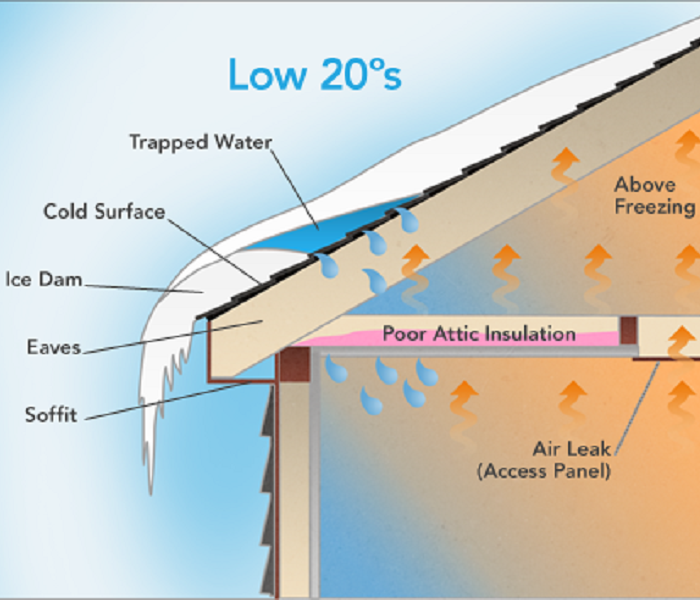 How Ice Dams Form: http://learningcenter.statefarm.com
How Ice Dams Form: http://learningcenter.statefarm.com
The past couple of years have brought on bitter cold winters and unexpected climate changes. This winter is holding true to form as we battle the current ice storm. These frigid temperatures can result in frozen/burst pipes & ice dams.
Bursting pipes alone can result in more than $5,000 in water damage, including the amount of damage that can be done from a flooded basement or flood damage in other parts of your home.
Another important and dangerous winter issue is ice dams that collect on the roof. Ice dams are created from snow melting from a warm part of the roof back down to a cold spot where the water refreezes and forms a dam. The ice dams continue to build up over cold days leaving a pocket for water to sit and leak through the roof.
Here are some preparation tips to protect your home this winter:
Make sure to insulate pipes. Pipe insulation can cost as little as $0.50 per liner foot according to the Institute for Business and Home Safety (IBHS).
Clean out gutters. By making sure there are no blockages in your gutters you can avoid ice dams, which cause water to back up and flow into the house.
Ensure there are no broken seals around windows and doors.
Check the roof for leaks or cracks in seals. These cracks usually form around vent and chimneystacks. Snow, which is mostly likely to collect on the downwind side of the roof, can cause damage to shingles.
What to Do Until Help Arrives
9/29/2014 (Permalink)
After learning more about the hazards of flooding, you may be curious about what to do in the event of an actual flood in your home or business. These emergency tips will help you take the proper action until we arrive on the scene. These tips can help reduce damage and increase the chances of a successful restoration.
Water Damage from Clean Water:
- Shut off the water source if possible or contact a qualified party to stop the water source.
- Turn off circuit breakers for wet areas of the building, if access to power distribution panel is safe from electrical shock.
- Remove as much excess water as possible by mopping or blotting.
- Wipe excess water from wood furniture after removing lamps and tabletop items.
- Remove and prop up wet upholstery cushions for even drying.
- Place aluminum foil or wood blocks between furniture and wet carpeting.
- Remove to a safe, dry place any paintings, art objects, computers, documents and other materials that are valuable or sensitive to moisture.
- Do not enter affected areas if electrical outlets, switches, circuit breakers or electrical equipment are exposed to water. Always avoid electrical hazards.
- Don't use a household vacuum to remove water. This could cause electrical shock or damage to the vacuum.
Water Damage from Contaminated Water (i.e. Sewage, Outside Water, ect.)
- Avoid all contact with sewage and any items contaminated by sewage.
- Wash your hands thoroughly after contact with contaminated items.
- Do not walk through damaged or wet areas. This could increase the possibility of spreading contamination.
- Do not use the HVAC system or fans to dry the structure, as this could spread contaminated air.
- Do not use any products for personal hygiene or cleanliness if exposed to the contaminated area.






 24/7 Emergency Service
24/7 Emergency Service








